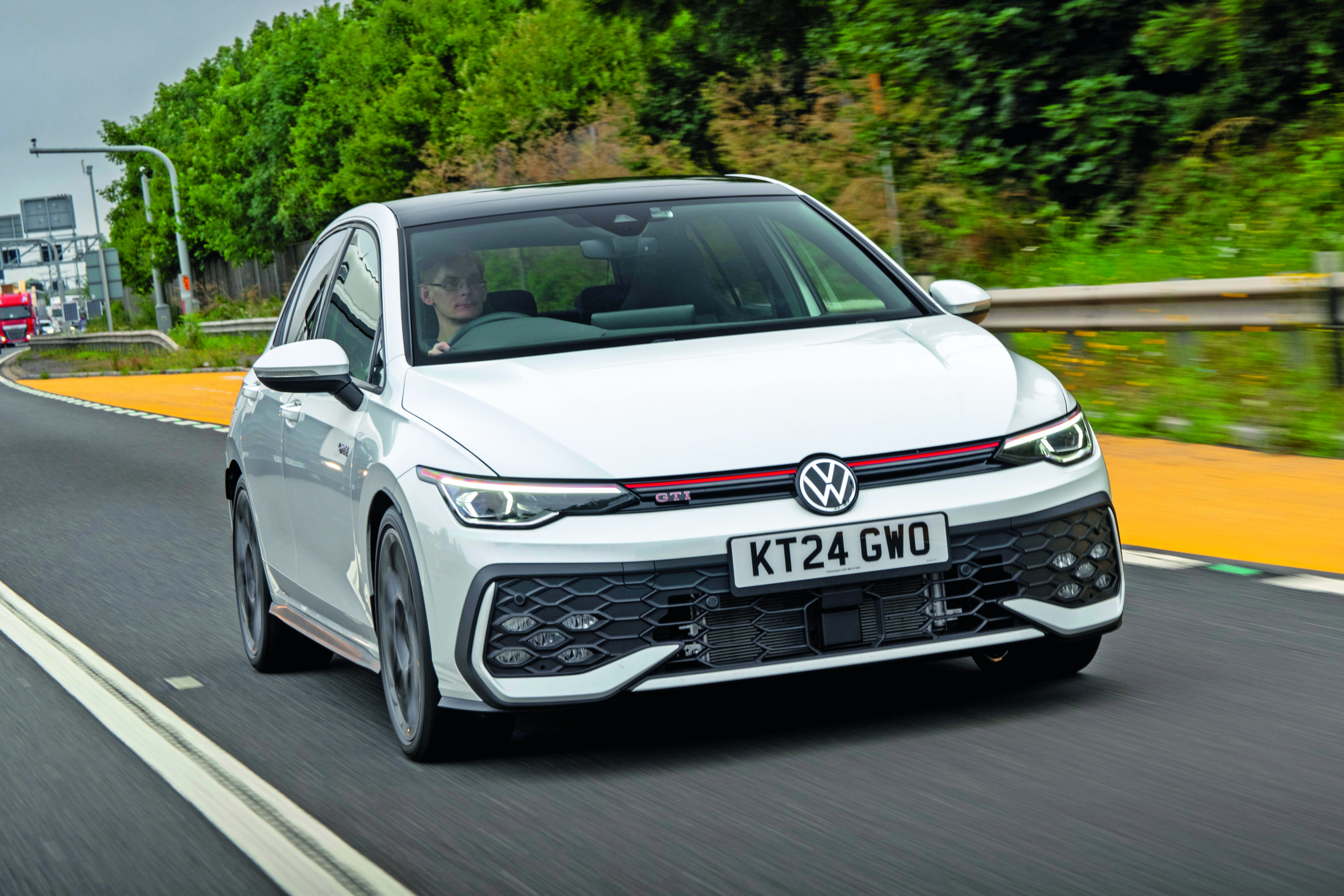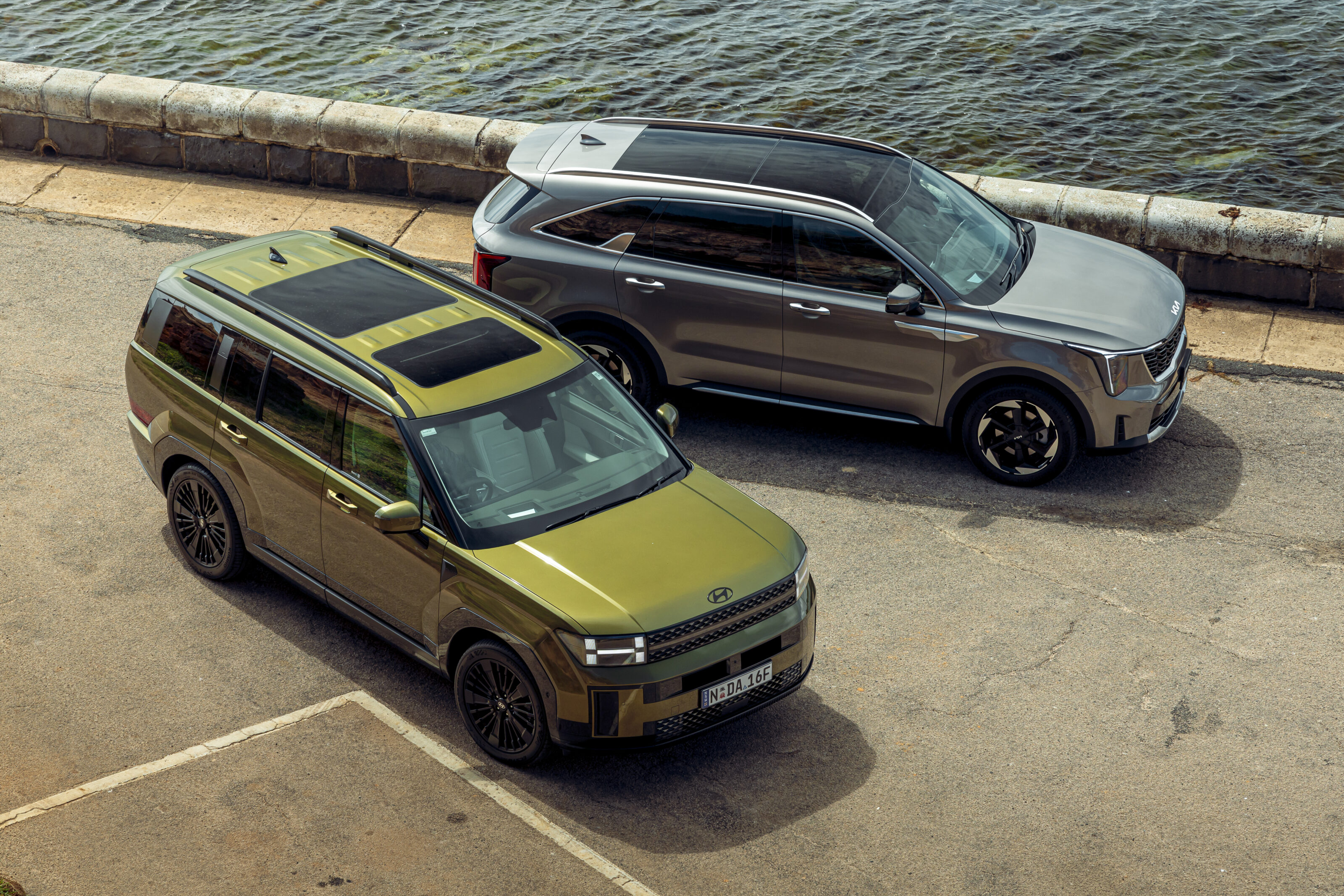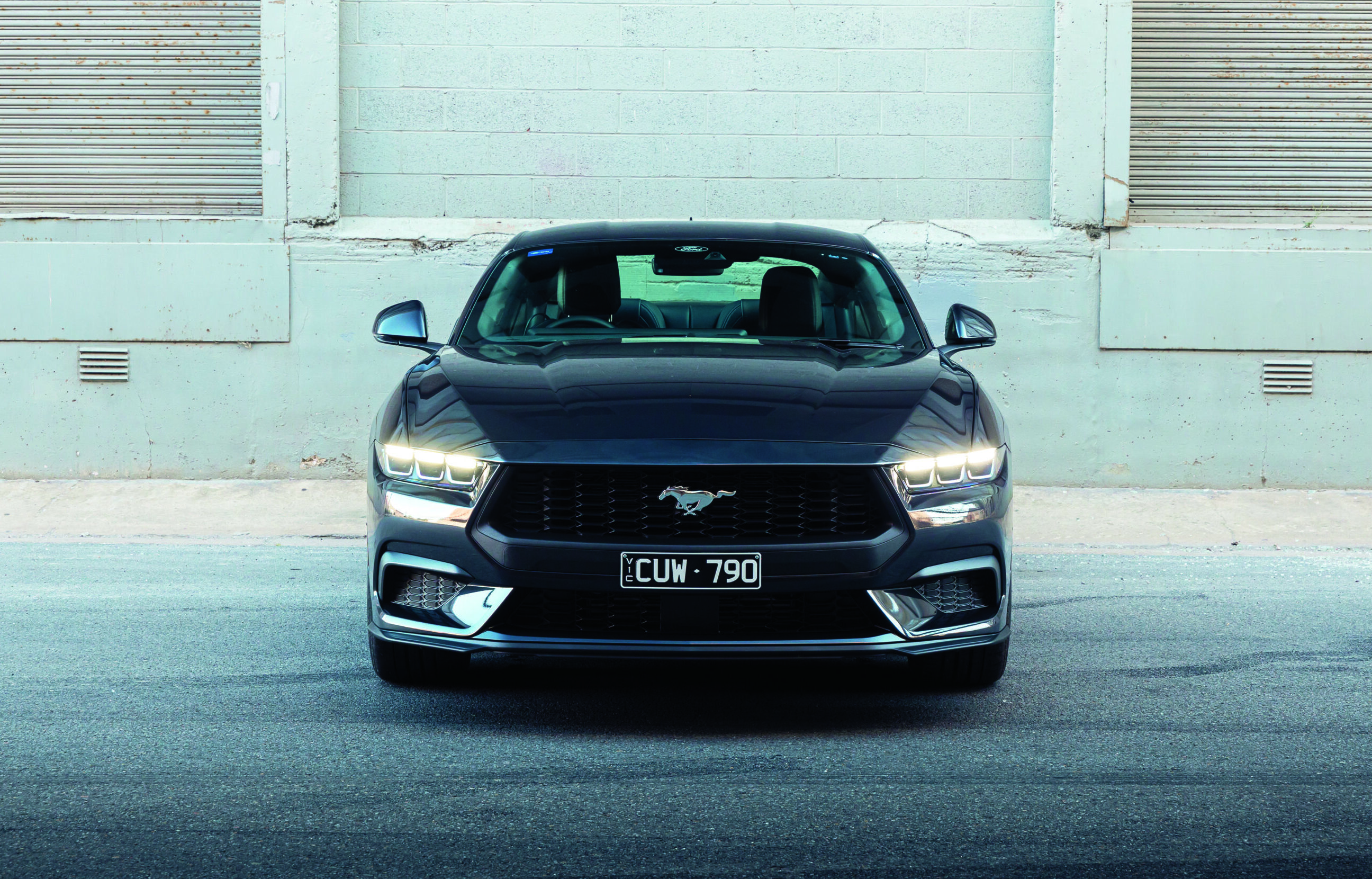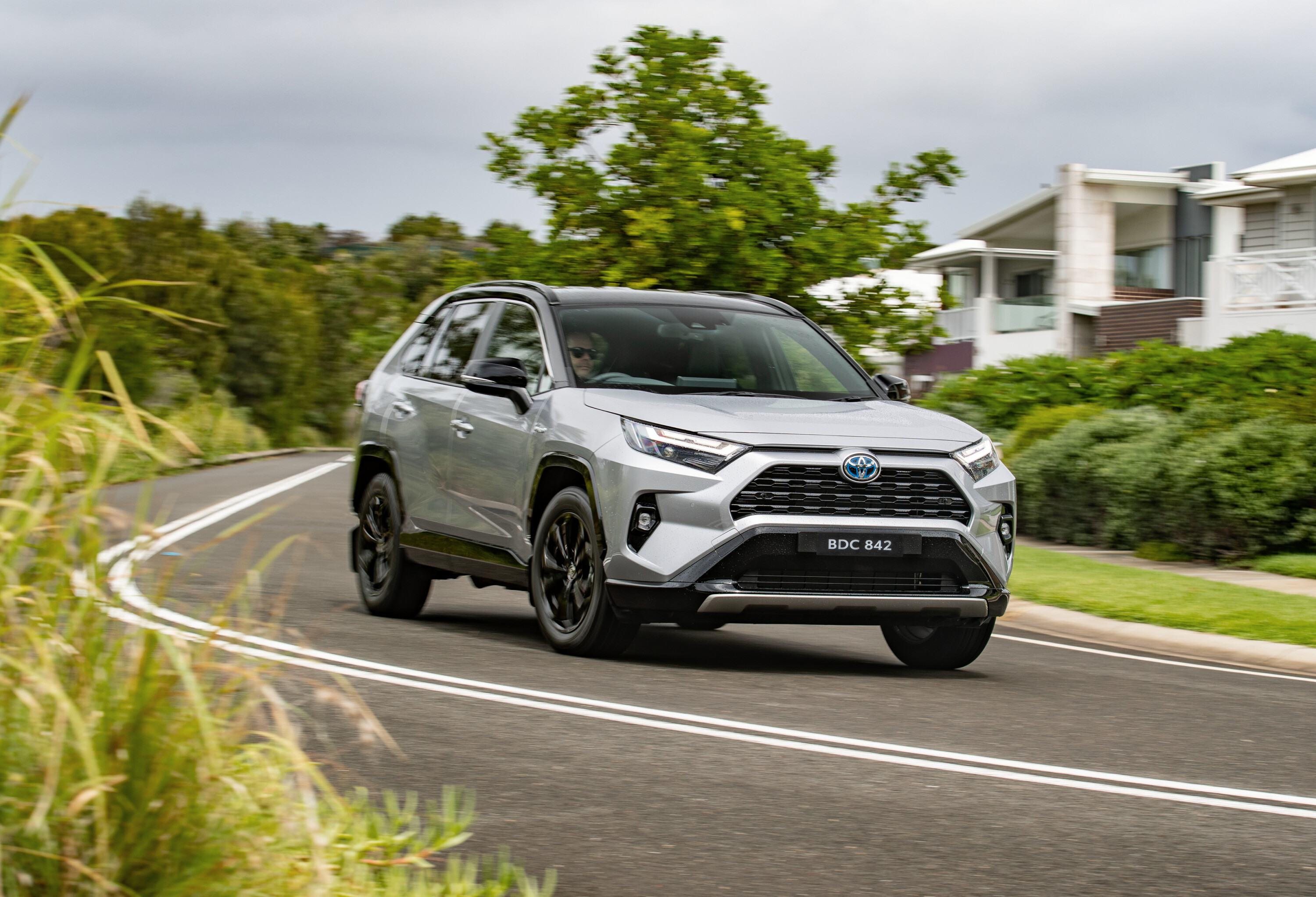
Score breakdown
Things we like
- Efficient hybrid powertrains
- Spacious
- Comfortable ride and fluid handling
- Funky cabin design in Edge
Not so much
- Nobody likes waiting
- Petrol engines are noisy
- Cabin feels a little cheap
- Base model GX best avoided
The Toyota RAV4 is Australia’s favourite passenger vehicle – and it wears that crown without threat, even in the face of turbulent production.
Factory shutdowns, shipping delays and parts shortages have all stemmed the flow of this medium SUV, yet it still outsells rivals.
As far as family cars go, the fifth-generation RAV4 is one of the easiest options to recommend. Its comfortable ride, fluid dynamics, solid safety suite and fuel-sipping engines make it one of the all-time great family hacks. The RAV4’s hybrid powertrains are pretty much runaway leaders in this class and are rated as low as 4.7L/100km in fuel efficiency cycles.
That said, not every RAV4 is perfect – at some price points rivals are far better. This is particularly true at the lower end, where the GX and GXL don’t offer the features that new-start Chinese rivals do.
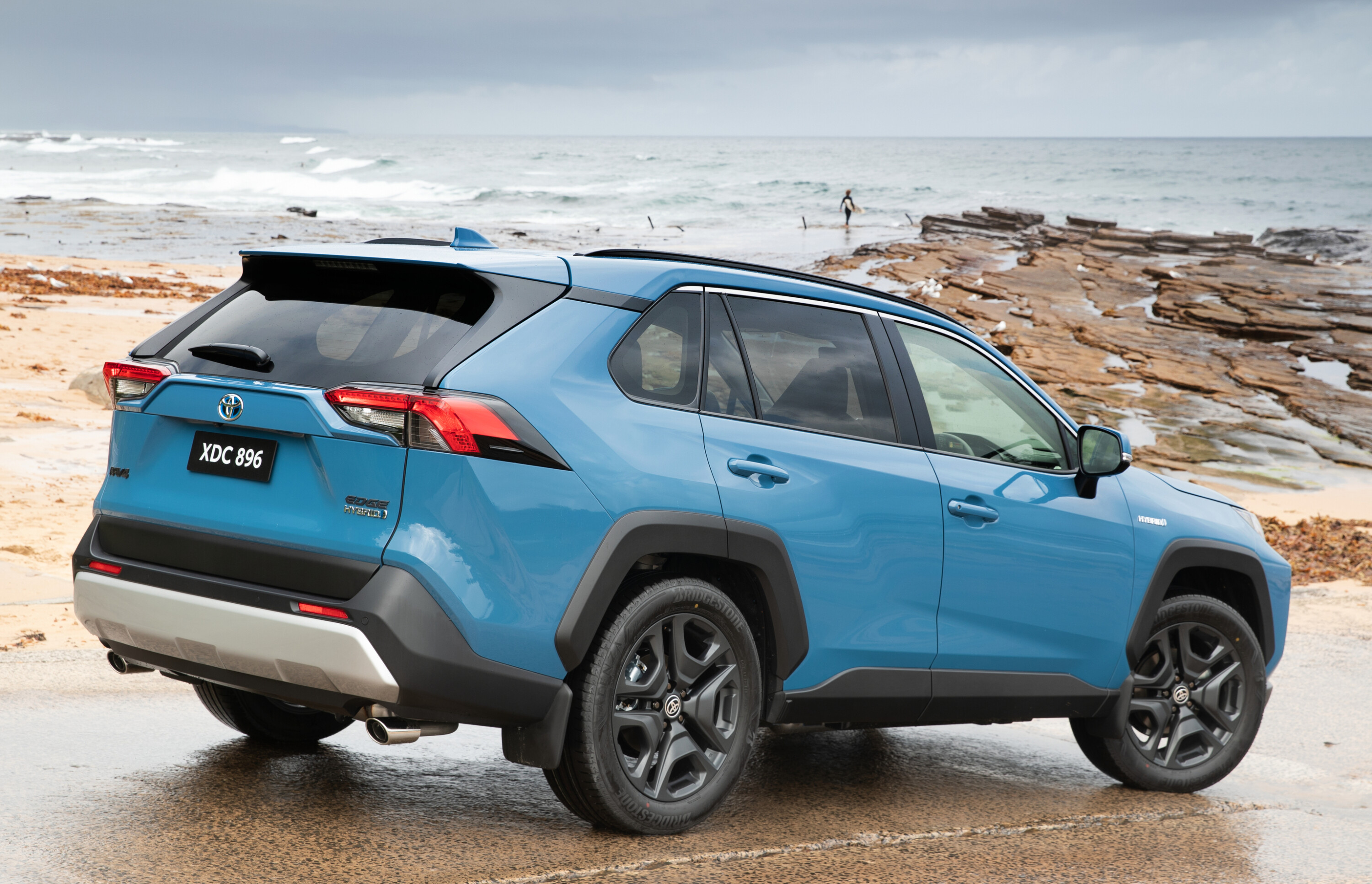
JUMP AHEAD
- Pricing
- What body styles are available for the Toyota RAV4?
- What features are standard in every Toyota RAV4?
- What key features do I get if I spend more?
- How safe is the Toyota RAV4?
- How comfortable and practical is the Toyota RAV4?
- How much boot space does the Toyota RAV4 offer?
- I like driving – will I enjoy this car?
- Which Toyota RAV4 engine uses the least fuel?
- What is the Toyota RAV4 towing capacity?
- How long is the warranty and what are the Toyota RAV4 servicing costs?
- Which version of the Toyota RAV4 does Wheels recommend?
- What are the Toyota RAV4’s key rivals?
- What might annoy me?
- Does any upgrade have a downside?
- What might I miss that similar cars have?
- What’s the infotainment system like?
- Where does Toyota make the RAV4?
- Are there plans to update the RAV4 soon?
Pricing
| 2024 Toyota RAV4 pricing | |
|---|---|
| GX 2.0 petrol FWD | $36,550 |
| GX 2.5 hybrid FWD | $39,050 |
| GX 2.5 hybrid AWD | $42,050 |
| GXL 2.0 petrol FWD | $40,100 |
| GXL 2.5 hybrid FWD | $42,600 |
| GXL 2.5 hybrid AWD | $45,600 |
| XSE 2.5 hybrid FWD | $45,700 |
| XSE 2.5 hybrid AWD | $48,700 |
| Cruiser 2.0 petrol FWD | $45,700 |
| Cruiser 2.5 hybrid FWD | $48,200 |
| Cruiser 2.5 hybrid AWD | $51,200 |
| Edge 2.5 petrol AWD | $53,020 |
| Edge 2.5 hybrid AWD | $55,150 |
Prices exclude on-road costs
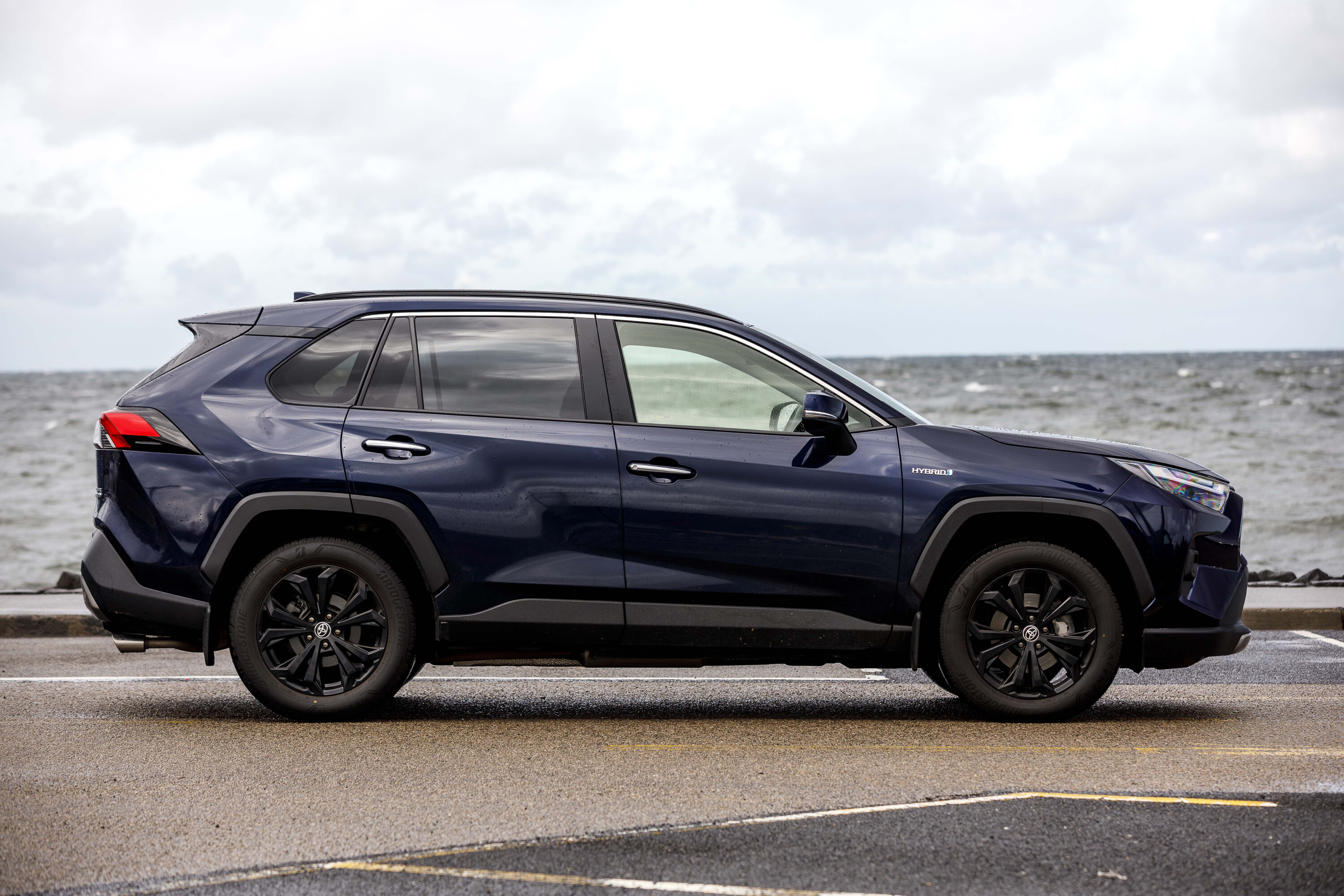
What body styles are available for the Toyota RAV4?
The Toyota RAV4 is a five-door, five-seat medium SUV with two rows of seating. There is no seven-seat variant or coupe derivative.
What features are standard in every Toyota RAV4?
The features listed below are standard in the entry-level model and will appear in higher-grade models unless replaced by more premium equivalent features.
| 2024 Toyota RAV4 standard features | |
|---|---|
| 7.0-inch semi-digital instrument cluster | 17-inch alloy wheels |
| Rain-sensing wipers | Front and rear carpet floor mats |
| Satellite navigation | 8-inch infotainment system |
| Five USB ports (4x USB-C, 1x USB-A) | AM/FM/DAB+ radio |
| Wireless Apple CarPlay and wired Android Auto | LED headlights (parabolic in petrol; projector in hybrid) and daytime running lamps |
| Push-button start (hybrid only) | Heated, power-folding side mirrors |
| Over-the-air software updates | Dual-zone climate control (hybrid only) |
| Cloth upholstery | 60/40 split-fold rear seats and centre armrest |
| Toyota Connected Services | LED interior lighting |
| Leather-wrapped steering wheel | LED fog lights |
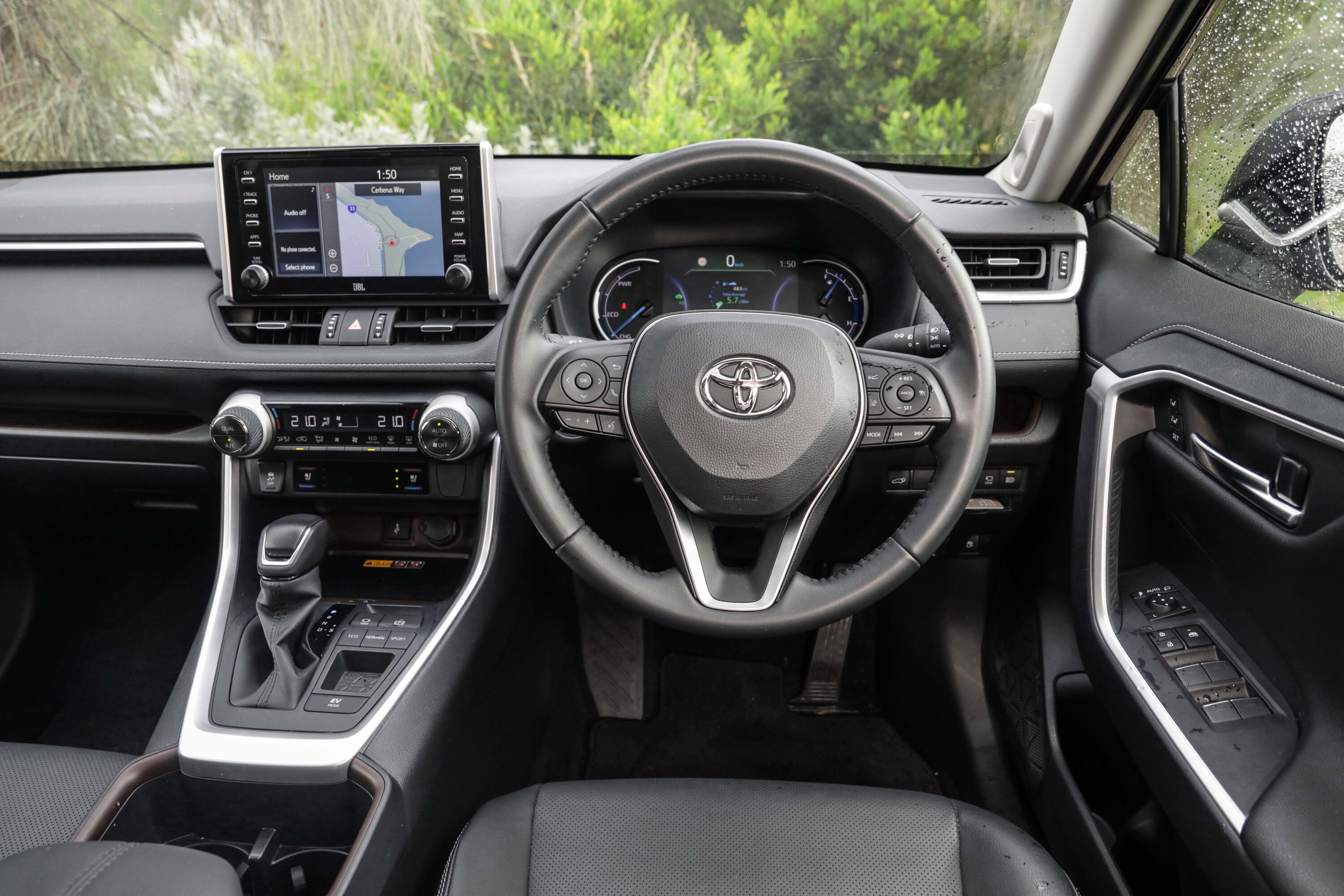
What key features do I get if I spend more?
There are five RAV4 variants, starting with the GX which gets the features listed above paired with a 2.0-litre petrol four-cylinder and front-wheel drive.
Hybrid power is available with front- and all-wheel drive for $2500 and $5500 extra respectively.
Moving up to the GXL nets a more attractive exterior with bigger 18-inch alloy wheels. You also get comfort and convenience features such as keyless entry, wireless phone charging and a leather-wrapped gear shifter.
The popular RAV4 GXL also brings
| 2024 Toyota RAV4 GXL features | |
|---|---|
| 18-inch alloy wheels (silver) | Front mud flaps |
| Keyless entry and push-button start | Auto-dimming rear-view mirror |
| Privacy glass | Roof rails |
| Wireless phone charger | Dual-zone climate control |
| Leather-wrapped gear shifter | Illuminated door switches |
The hybrid-only RAV4 XSE gets a unique look, with all the features above plus:
| 2024 Toyota RAV4 XSE features | |
|---|---|
| 10.5-inch infotainment system (new) | 10-way power-adjustable driveru2019s seat with lumbar support |
| Leather-accented u2018premiumu2019 upholstery | Gloss black exterior trims |
| 12.3-inch digital instrument cluster (new) | Interior ambient lighting |
| Leather-accented door trims | Power tailgate |
| Connected satellite navigation (new) | Black headliner |
| Heated front seats | Black roof |
| 18-inch alloy wheels (black) | |
Previously the range-topper, the RAV4 Cruiser is a most complete specification with an on-road focus
| 2024 Toyota RAV4 Cruiser features | |
|---|---|
| Automatic heated, power-folding side mirrors | Eight-way power-adjustable front passenger seat |
| Digital rear-view mirror | Nine-speaker JBL audio system |
| Heated and ventilated front seats | Leather upholstery |
| 360-degree camera system, with underfloor view | Electric glass sunroof |
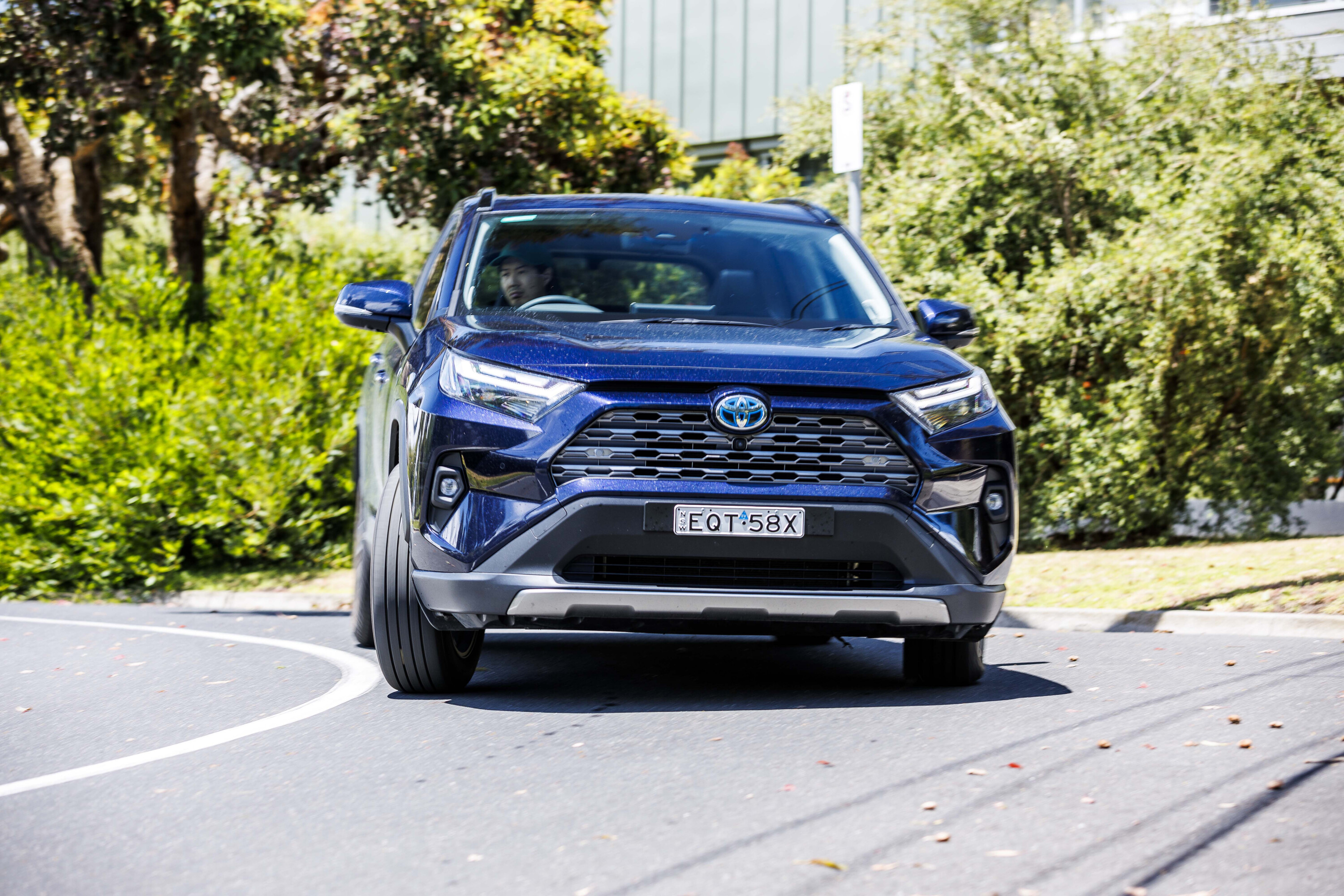
The most expensive RAV4 grade, the Edge, has a distinct off-road flavour with outdoorsy orange interior highlights. It also gets:
| 2024 Toyota RAV4 Edge features | |
|---|---|
| 19-inch alloy wheels (matte grey) | Hill-descent control |
| Projector-type LED headlights (petrol) | Rear cross-traffic assist |
| Off-road selector dial | Parking support brake |
How safe is the Toyota RAV4?
The Toyota RAV4 scored a five-star ANCAP safety rating based on testing conducted in 2019. This score applies to all variants and every powertrain.
It scored 93 per cent in adult occupant protection and 89 per cent in child occupant protection criteria, with an 85 per cent result in the vulnerable road user protection test and 83 per cent for its safety assistance systems.
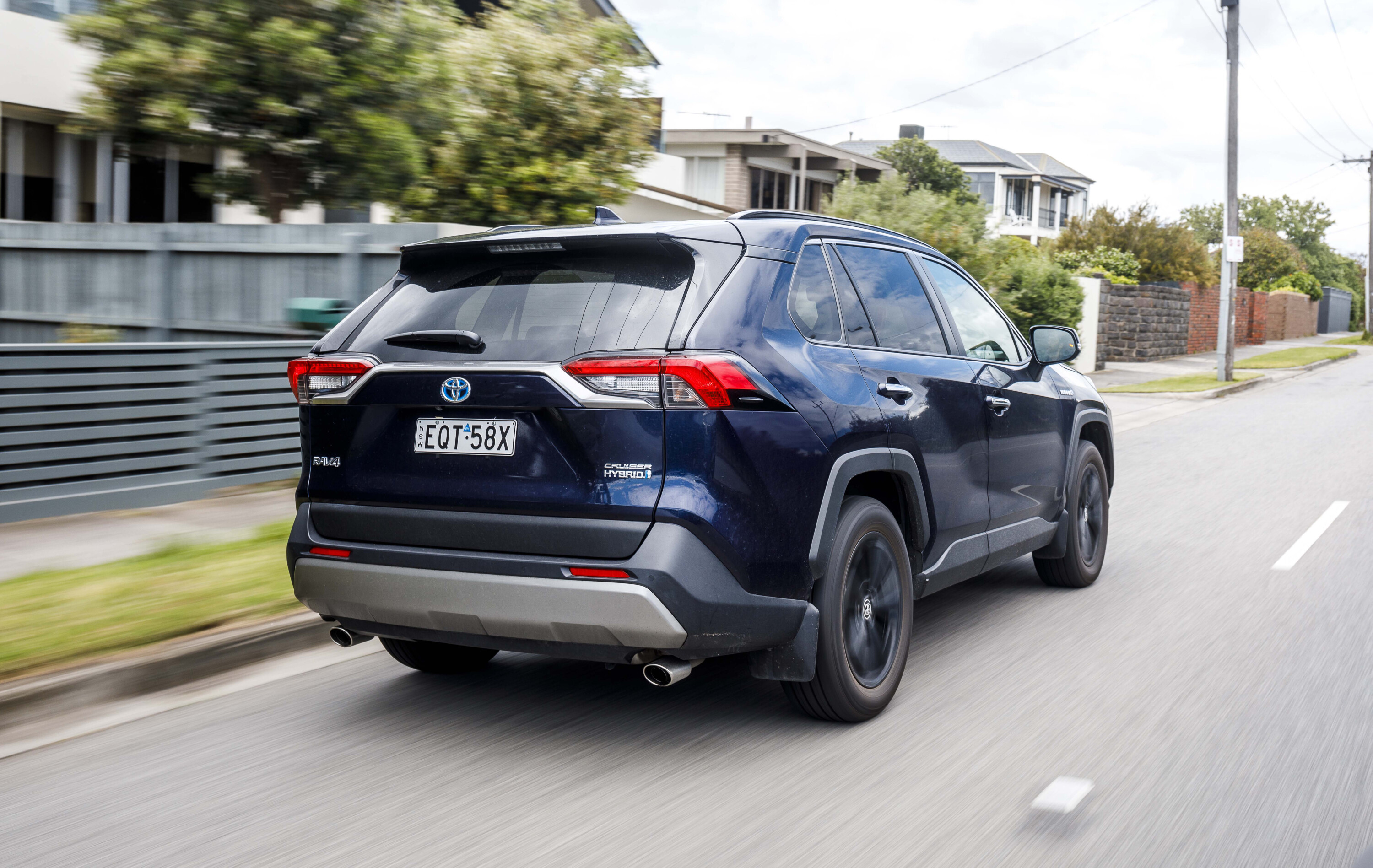
The RAV4 range is fitted with seven airbags: dual front, side, curtain and driver’s knee, across the range.
Toyota equips every RAV4 variant with an impressive array of safety features, as seen in the table below, including convenient parking sensors front and rear.
| 2024 Toyota RAV4 standard safety features | |
|---|---|
| Autonomous emergency braking (vehicle, pedestrian, cyclist, junction) | Seven airbags |
| Lane-keep assist | Adaptive cruise control |
| Lane departure warning | Traffic sign recognition |
| Blind-spot monitoring | Front and rear parking sensors |
| Rear cross-traffic alert | Rear seat belt reminder |
Additionally, the Cruiser grade gets a 360-degree camera with underfloor view, while the range-topping edge adds low-speed reverse auto emergency braking and rear cross-traffic alert.
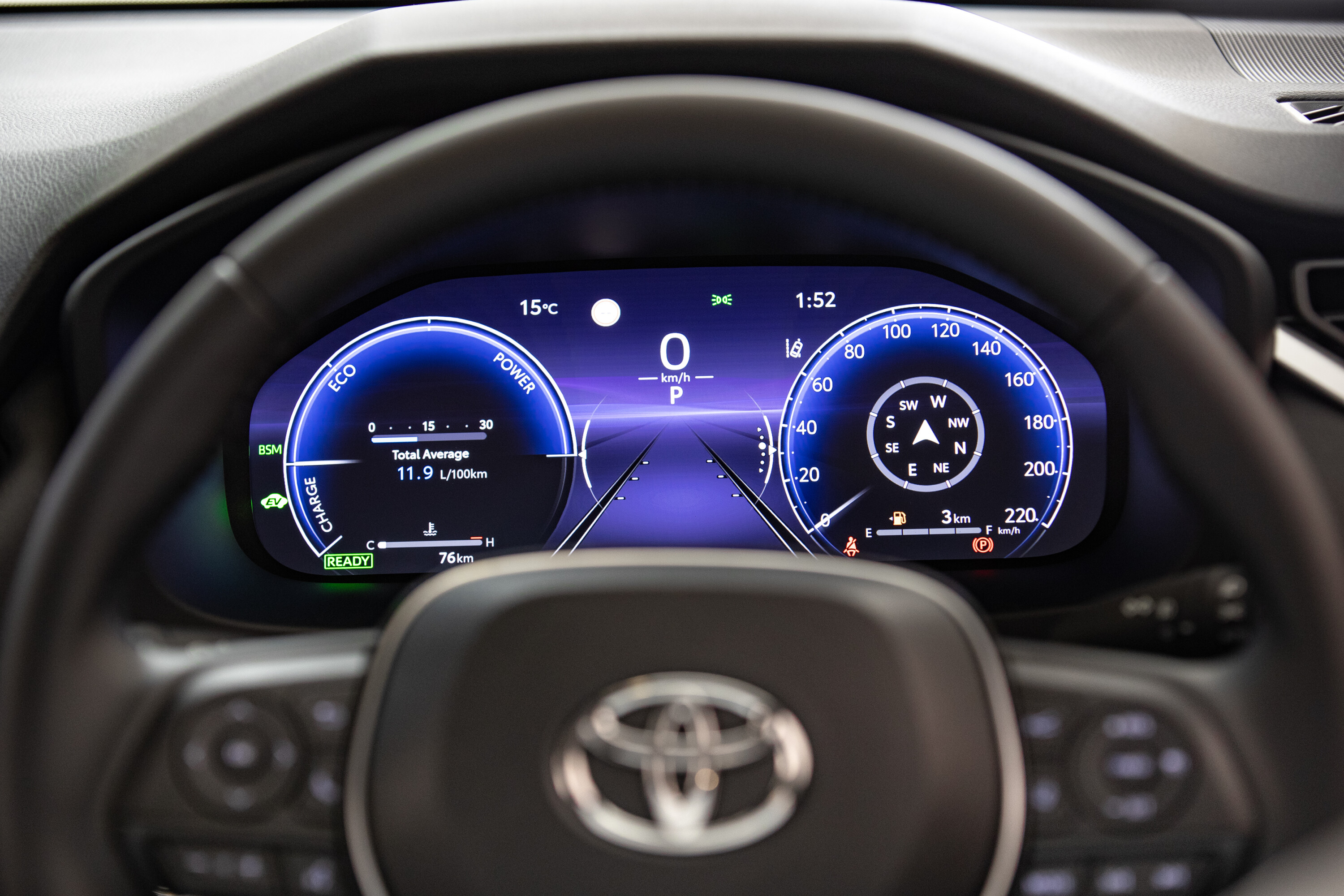
How comfortable and practical is the Toyota RAV4?
The GX and GXL have hard-wearing fabric trim so, although not as easy-clean as vinyl or leather, it will stand up to abuse from young children.
Most of the plastics are of good quality, and there is an overwhelming feeling of durability.
Aside from simple sturdiness, the RAV4 has some interesting design cues such as the chunky rubberised climate controls and angular dash design.
Moving up through the range is worth it. The XSE gets more exciting interior materials, and the Cruiser’s leather upholstery is matched with three-stage heating and ventilation – great for a country like Australia.
Seat adjustment is good for the driver in RAV4s with 10-way power adjust for the driver, including lumbar, from XSE up, however only the Cruiser is equipped with a powered passenger seat that features height adjust.
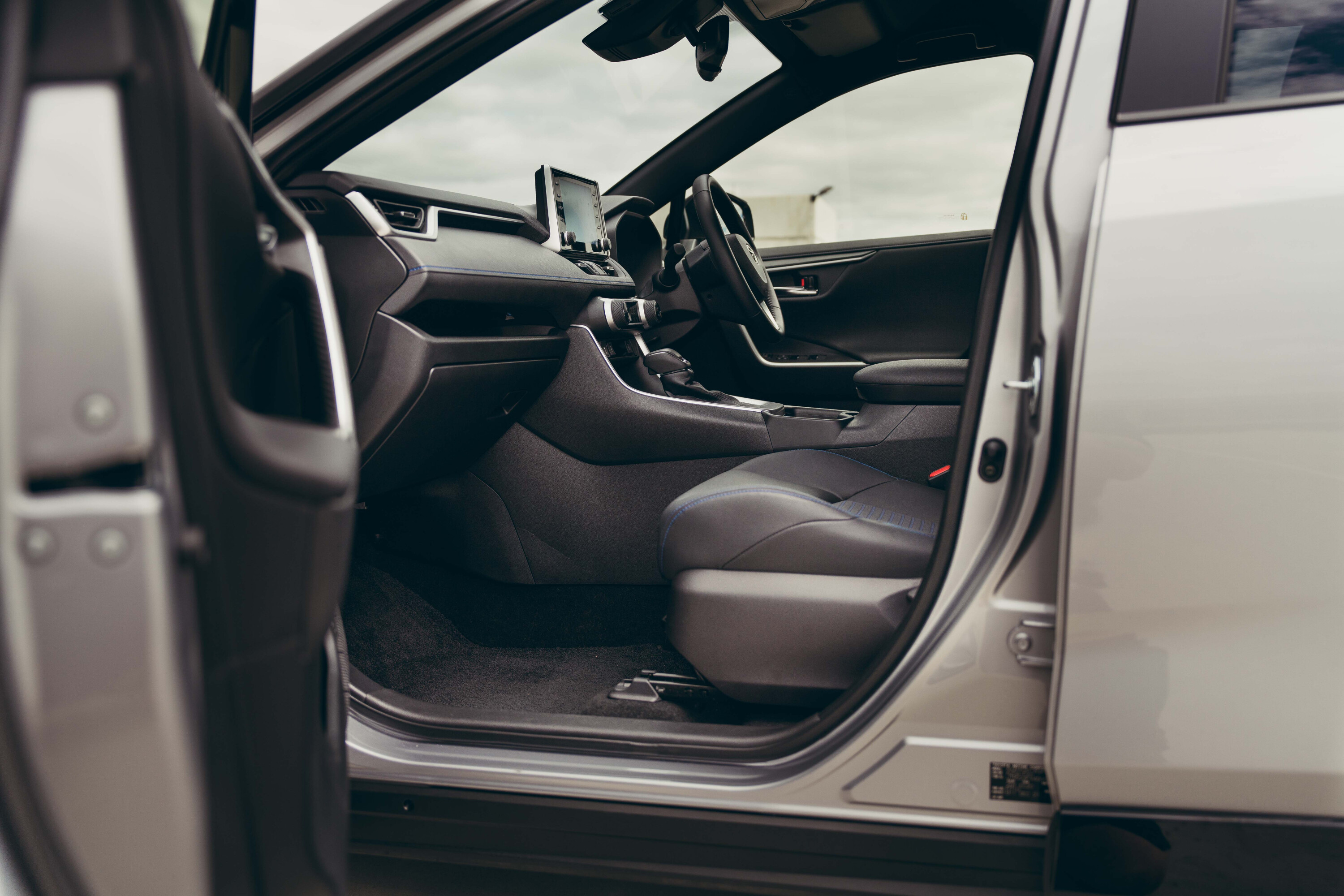
There are clever practical touches in all RAV4s, including a rubberised tray ahead of the passenger that is perfect for smartphones, sunglasses, or notepads.
However, it has small door bins and its child seat anchors are difficult to access.
A technology improvement will arrive this year with the addition of subscription-based connected services for the Toyota RAV4 and new infotainment software. There will also be digitised instruments in place of analogue dials and small TFT information displays.
The rear seat has an adjustable backrest, but no sliding bench. It offers excellent legroom for adults, but the ends of the bench are set in slightly from the doors and the RAV4 doesn’t use its external width effectively. This means it is most comfortable for two adult passengers in the back.
A pair of USB-C outlets feature in MY23 RAV4s, though prior year models are equipped with USB-A chargers. There are two adjustable air vents for second-row passengers from GXL trim up.
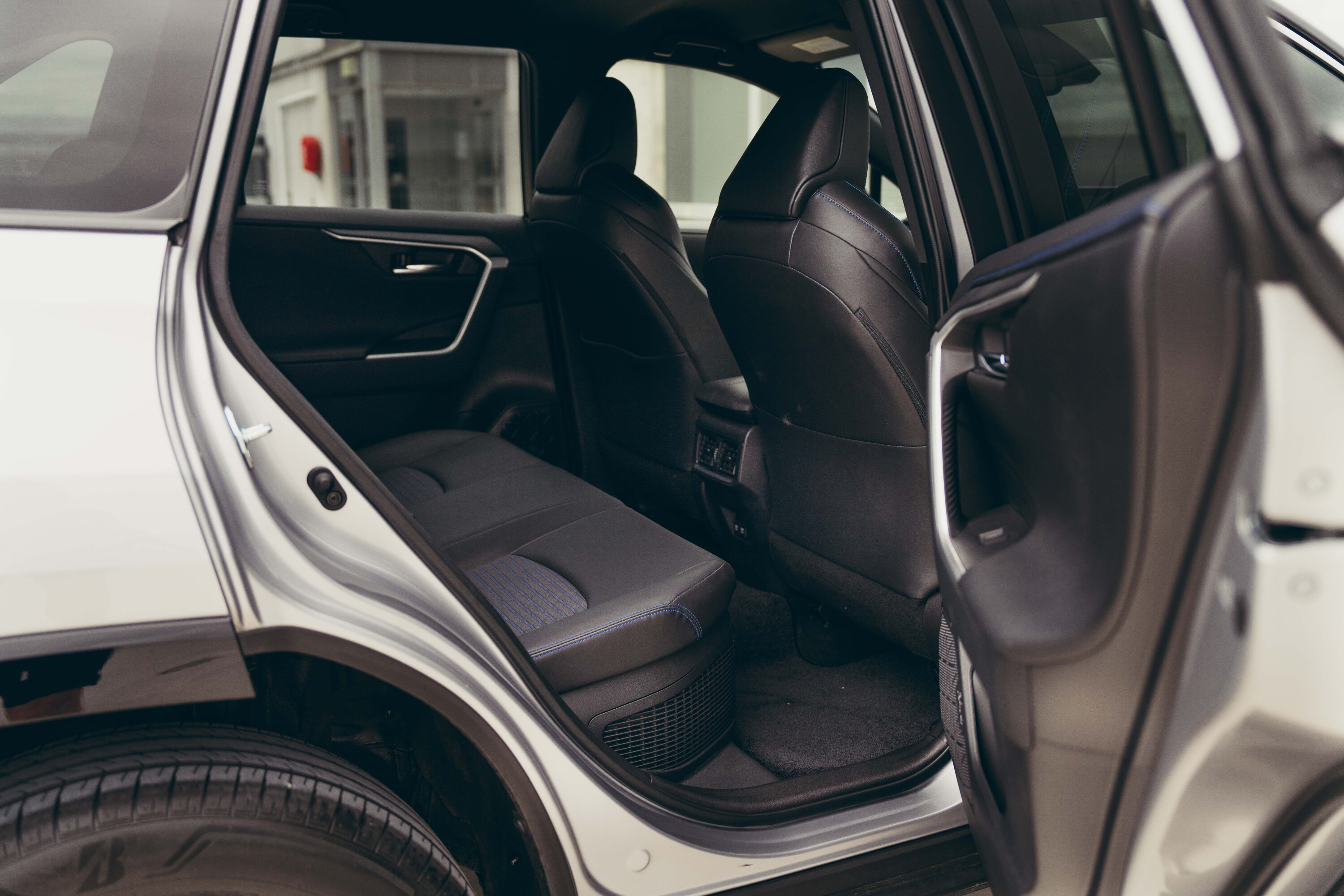
How much boot space does the Toyota RAV4 offer?
With the rear seats up, the Toyota RAV4 has a 580-litre boot capacity with a space-saver spare. A full-size spare is optional on GX models.
Folding the second row increases luggage capacity to 1690 litres.
The RAV4’s boot is large for the class, though it doesn’t have many smart touches. There are no shopping bag hooks, nets, or clever cargo dividers. The RAV4’s boot is wide and square enough to easily fit a pram.
A removable floor panel can be mounted at two different height settings or flipped over to protect its carpeted side from dirty or wet cargo. A manual tailgate is standard, with a power item fitted to XSE trims and above.
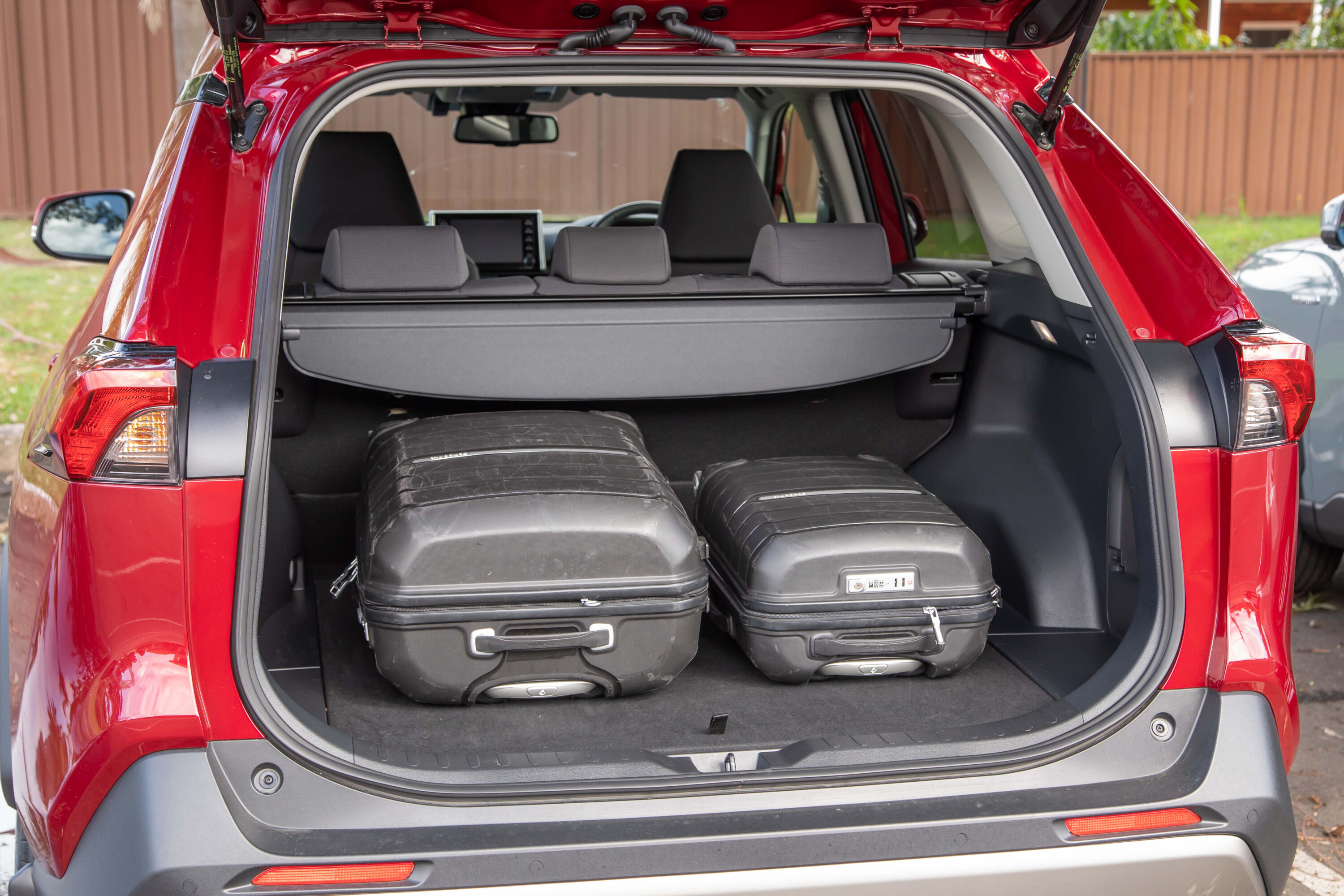
I like driving, will I enjoy this car?
The Toyota RAV4 is a likeable and mostly quiet SUV that rides superbly. It’s also talented enough not to leave you wanting on a twisty road.
Whereas the first four generations of RAV4 did little more than the job at hand, and rather blandly, with the launch of the fifth-gen car Toyota struck an excellent balance between handling fluency and superb ride comfort.
Smaller alloys and chubbier tyres on the base GX and GXL make for a composed and comfy vehicle over local B-roads. Dips, bumps and ruts are dispensed easily and the dampers don’t need a second rebound stab at regaining composure. The RAV4 also has some of the lightest and most accurate steering in its class.
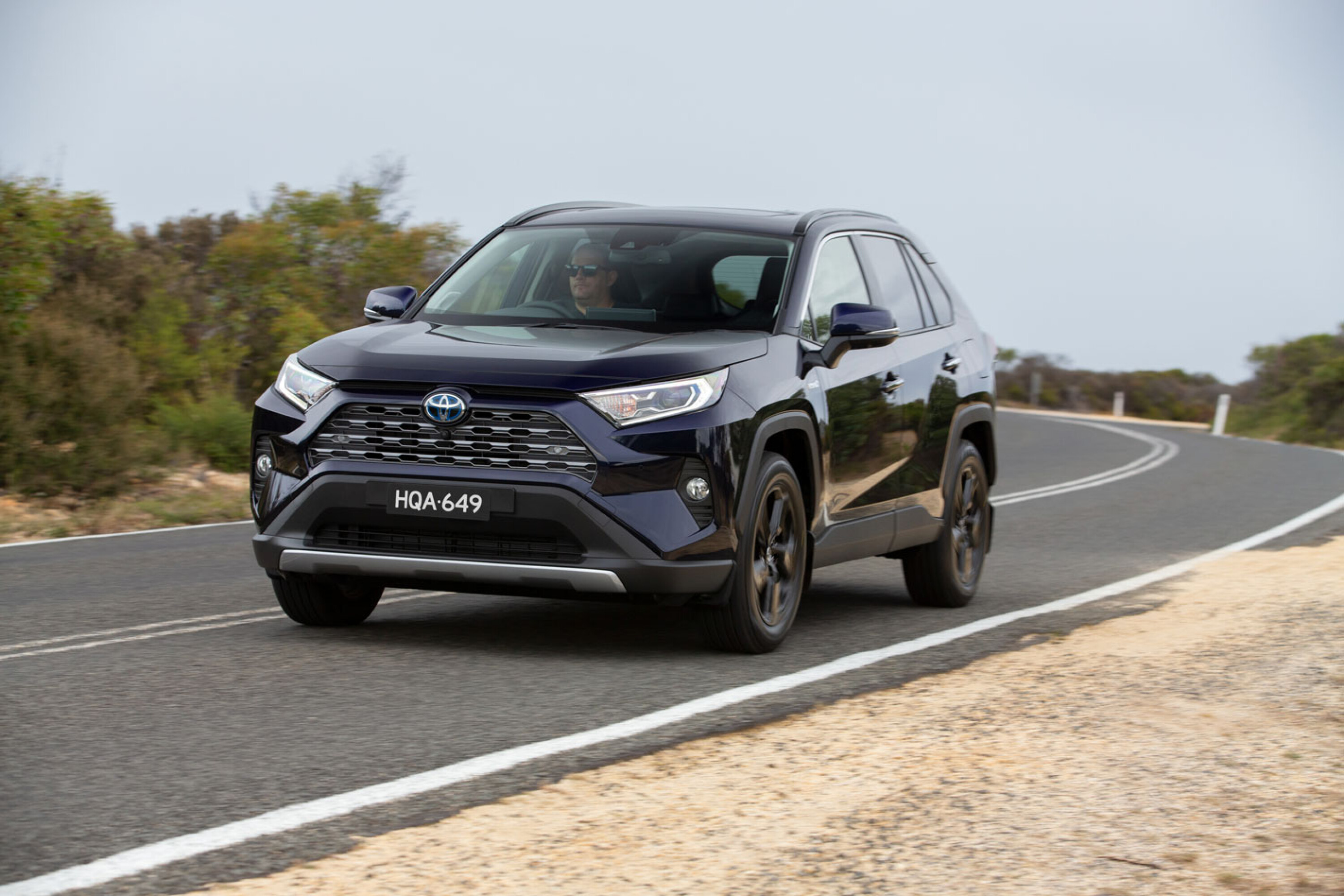
Even the flagship Edge and Cruiser with their larger 18- and 19-inch alloy wheels remain comfortable and compliant both around town and out in the country.
Vehicles like the Volkswagen Tiguan may be faster on twisty roads, but the RAV4 does everything you need and more.
Though the RAV4’s hybrid powertrains handily motivate the medium SUV, they can be vocal when doing so. In front-drive form, the RAV4 hybrid produces 160kW and the AWD versions with an extra motor at the back increase that to 163kW. Toyota does not quote combined torque figures for the hybrid.
It’s best to skip the 127kW/203Nm 2.0-litre petrol engine, if you can, as it lacks the mid-range torque of the hybrids. The other option, exclusive to the Edge, is a flexible 2.5-litre petrol producing 152kW/252Nm. It has the advantage of a mechanical on-demand AWD system to improve the RAV4’s traction on loose surfaces.
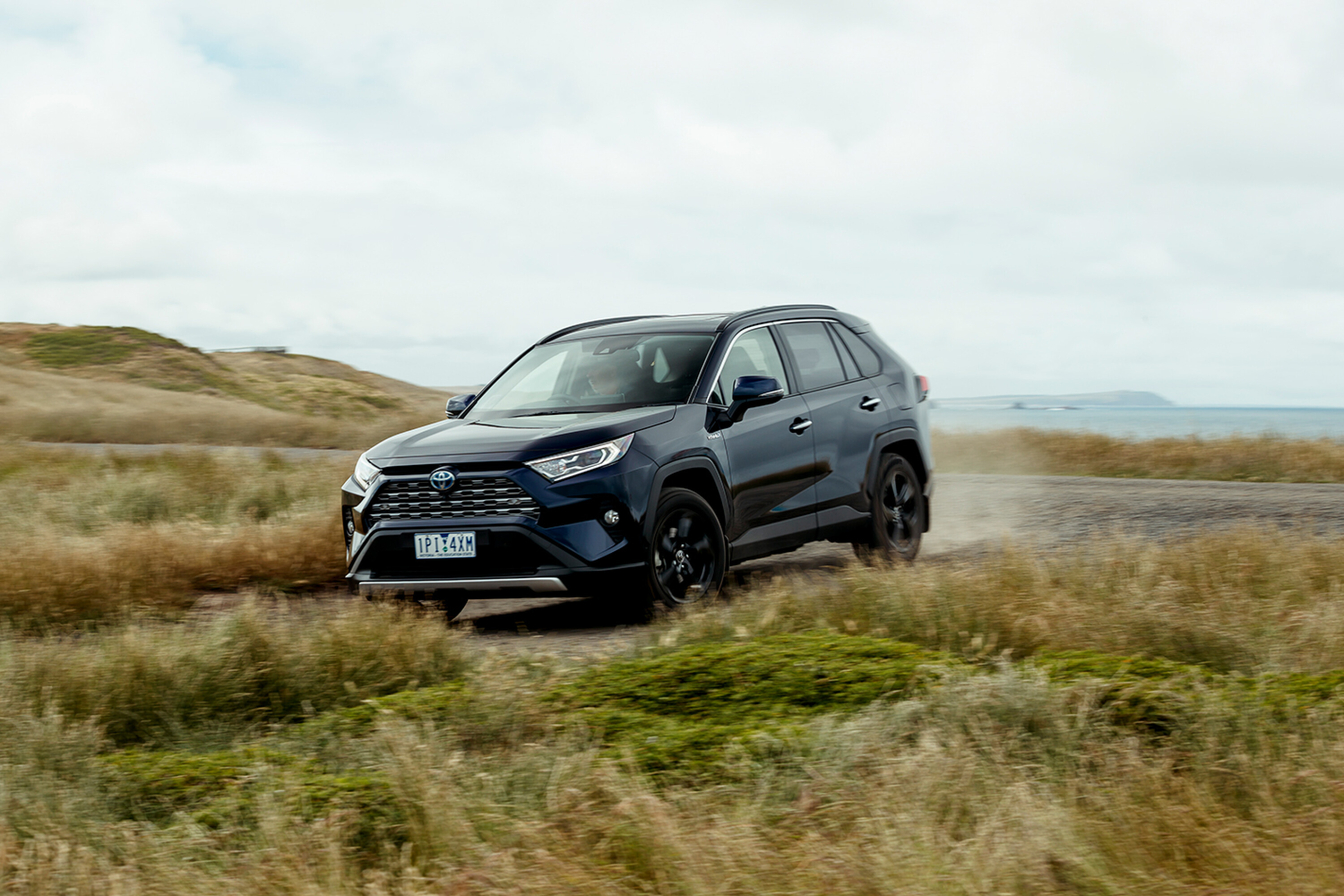
One thing worth noting is that, in the wet, the front-drive models tend to scrabble for traction and activate traction control at lower velocities than AWD variants.
The hybrid powertrains are what we recommend. They offer near-silent low-speed operation with the front electric motor (and with optional AWD, the additional rear power unit) able to move the RAV4 from rest to 30km/h in quietude – providing the circa-1kWh battery has enough juice.
Broadly capable but fairly unexciting is perhaps the easiest way to summarise the RAV4’s dynamics. It clearly favours ride comfort and urban road manners over driver involvement but that’s not to say it feels out of place on a twisty country road.
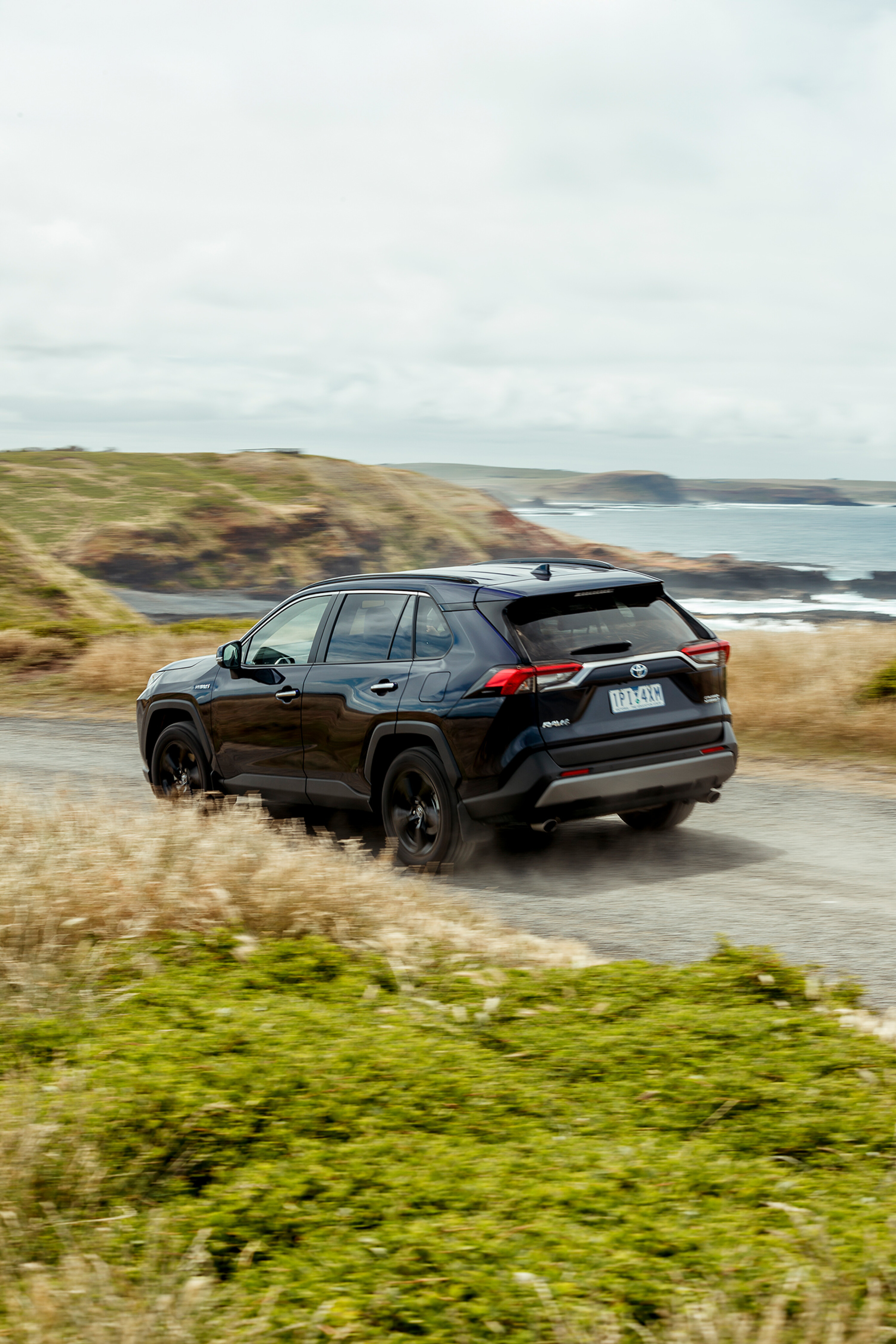
Which Toyota RAV4 engine uses the least fuel?
The RAV4 FWD hybrid consumes 4.7L/100km on the combined ADR cycle, making it not only the most efficient RAV4, but the most efficient non-plug-in medium SUV on sale.
The added weight of the AWD system brings the RAV4’s consumption up to 4.8L/100km.
Compared to plug-in hybrid SUVs, the RAV4 hybrid also makes it easy to hit its fuel efficiency claims in the real world – a rare feat.
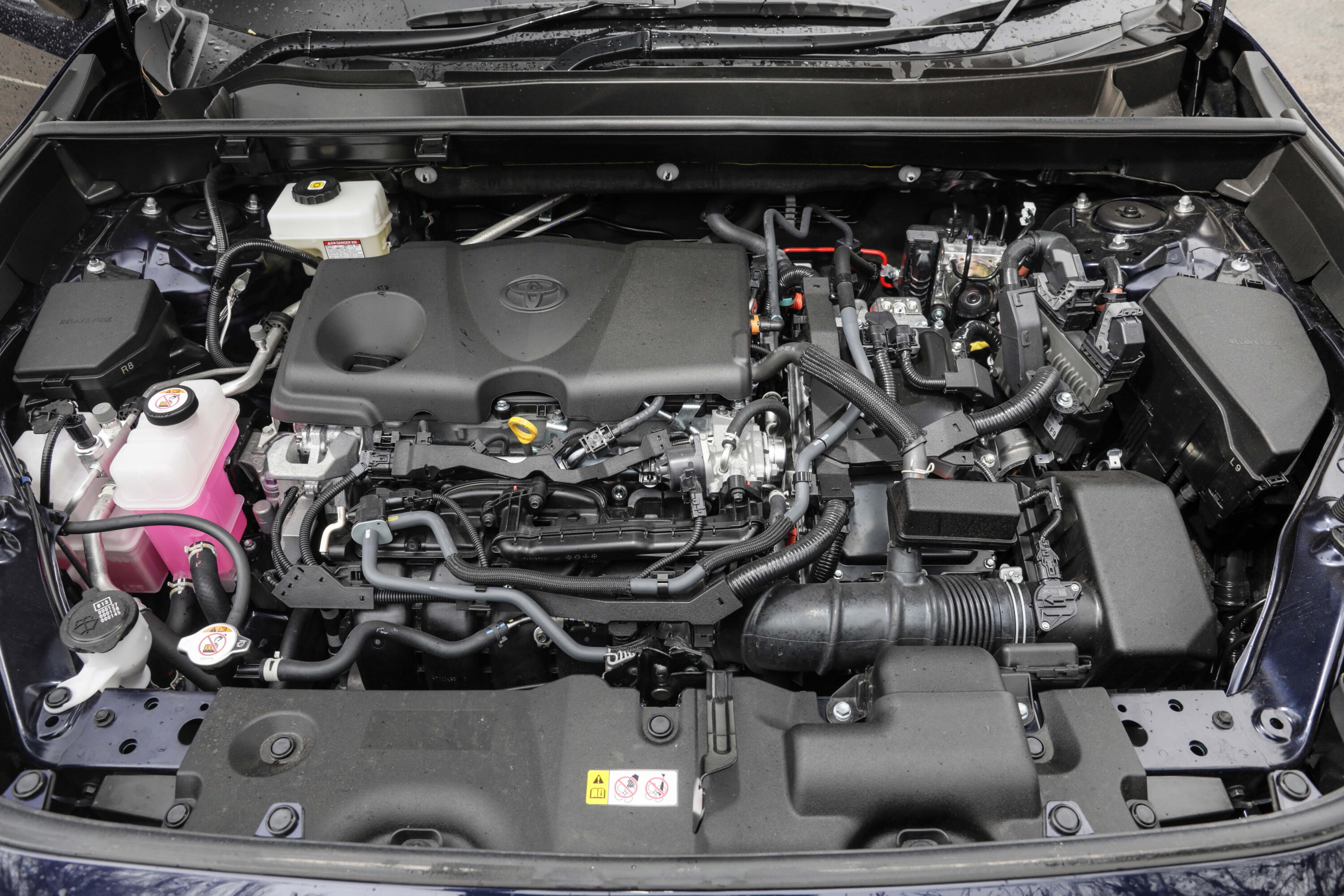
What is the Toyota RAV4’s towing capacity?
The RAV4’s towing credentials are not the strongest in this class. Diesel and turbo-petrol SUVs offer higher braked towing capacities and will pull a load better on the freeway.
With a hybrid AWD drivetrain or the 2.5 petrol AWD of the Edge variant, the Toyota RAV4 is rated to tow a 1500kg braked load.
Meanwhile, the front-drive petrol maxes out at 800kg with trailer brakes, and the FWD hybrid just 480kg with or without trailer brakes.
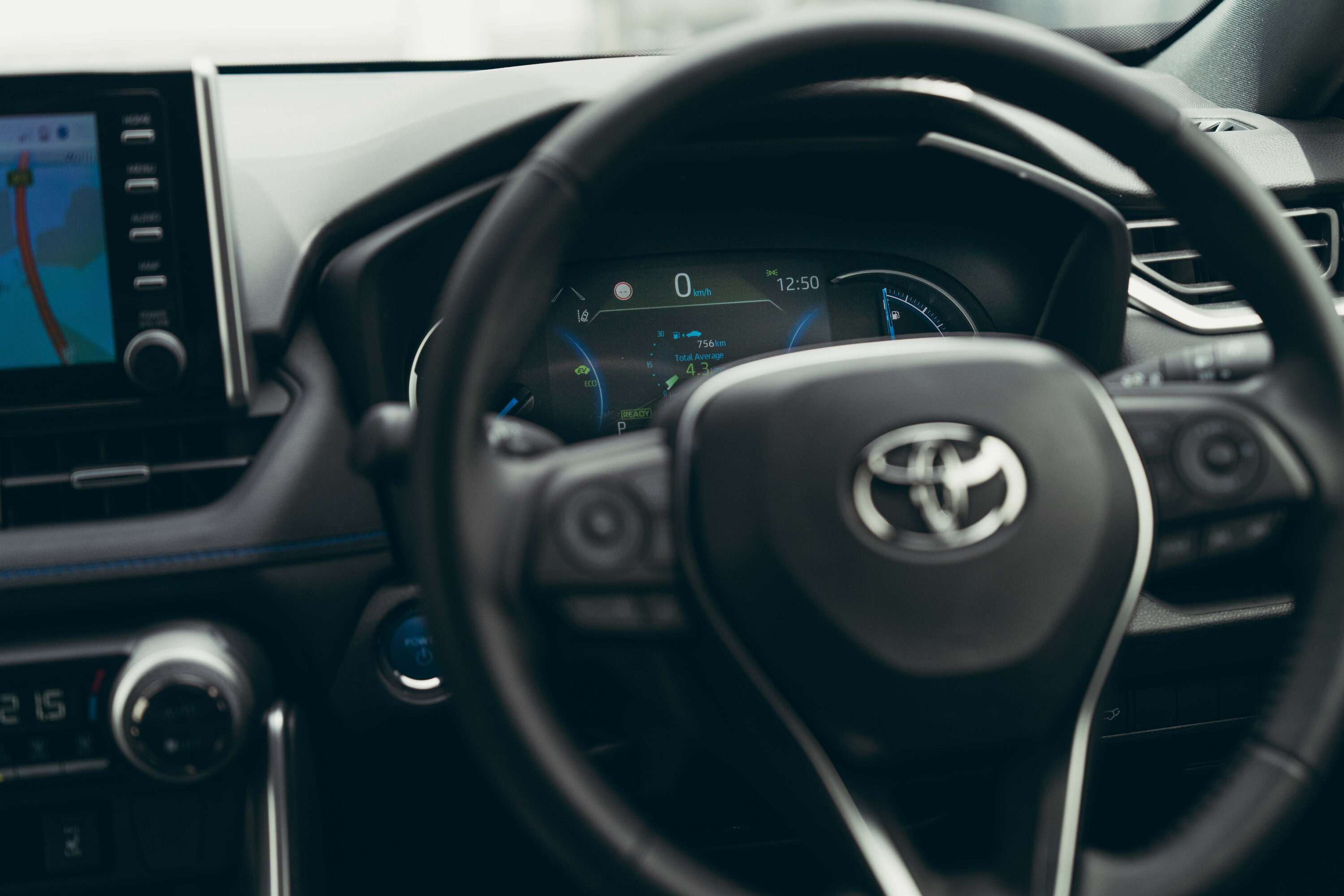
How long is the warranty and what are the Toyota RAV4’s servicing costs?
The Toyota RAV4 is backed by a five-year, unlimited-kilometre warranty. If you keep up-to-date on servicing, this extends to eight years for the powertrain of hybrid models.
Service costs are kept extremely simple, with a single $260 price per interval across all variants locked in for five years, making it just about the cheapest in its class to maintain at $1300 for five years or 75,000km.
RAV4 service intervals are 12 months or 15,000km for all variants.
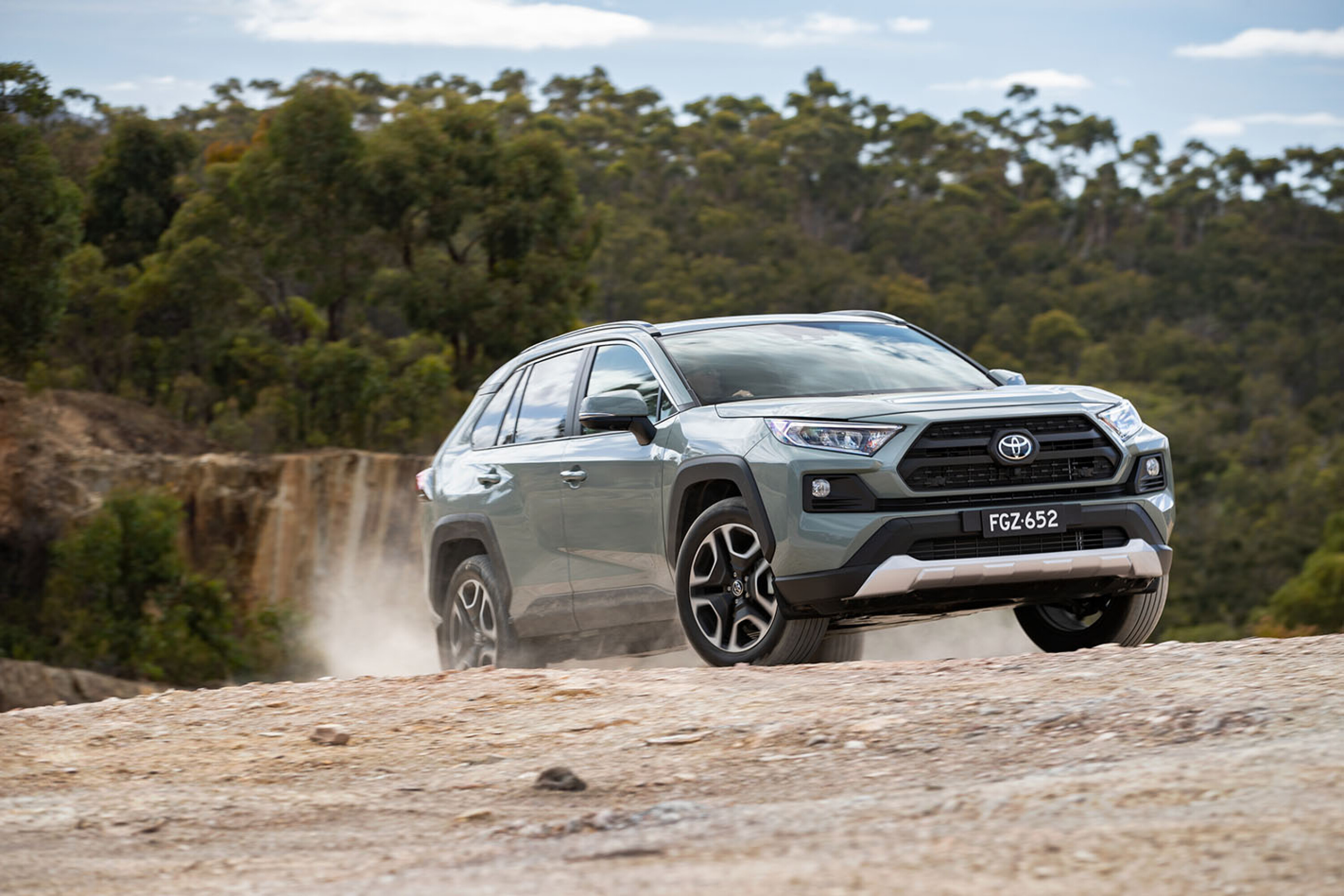
Which version of the Toyota RAV4 does Wheels recommend?
In GX you’re left wanting for creature comforts (if not safety, convenience features or efficiency). The GXL is where a private buyer will want to draw the lowest line.
Regardless of trim, we recommend the hybrid powertrain – FWD for most, AWD if you want a little extra traction and confidence. The XSE trim makes for a fully-featured family hauler and the Cruiser only adds icing on top.
While you pay more for the Edge and don’t get a whole lot of substance in return, its bold colour palette may indeed suit your tastes. It’s also a better off-road package – but if you really want to go bush in your medium SUV we’d recommend a Subaru Forester.
That (and waiting times) aside, the Toyota RAV4 dominates the market with good reason. It majors on value, space, equipment, safety and efficiency – all crucial measures of a good family vehicle.
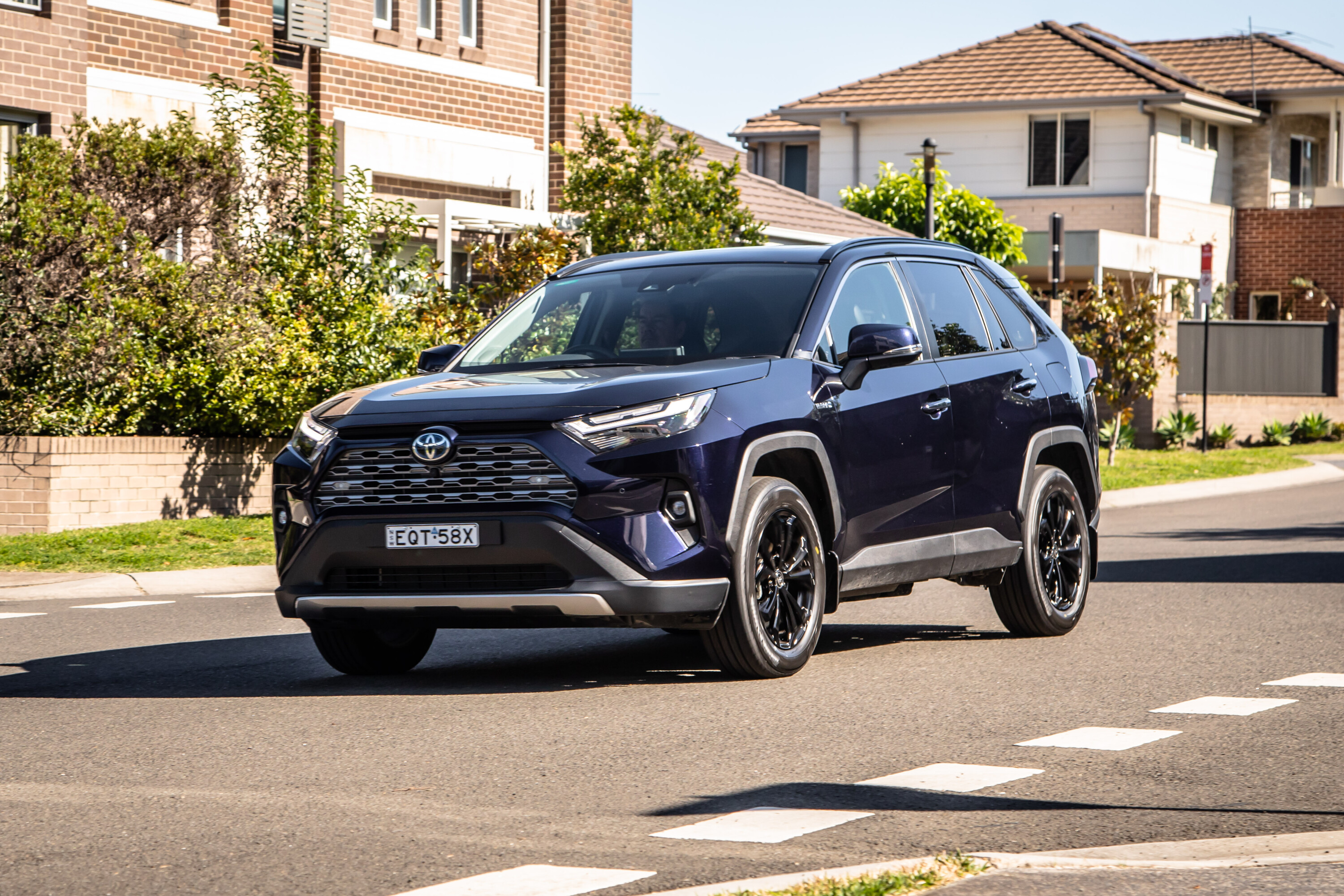
What are the Toyota RAV4’s key rivals?
- Nissan X-Trail
- Subaru Forester
- Mazda CX-5
- Kia Sportage
- Mitsubishi Outlander
- Hyundai Tucson
- Honda CR-V
- Volkswagen Tiguan
- Haval H6
- MG HS
What might annoy me?
Compared to rivals, the Toyota RAV4 does lack for sound insulation, especially when it comes to heavy acceleration as the shouty four-cylinder petrol engine has to work hard.
Take care in looking for a new RAV4; the MY23 upgrade is highly recommended as it brings a much-needed boost to the RAV4’s technology suite with bigger, higher-resolution screens that will stay fresher for longer.
As it is such a popular model, the Toyota RAV4 has been struck by extended wait times in Australia, with some dealers quoting a turnaround longer than 12 months for a new example.
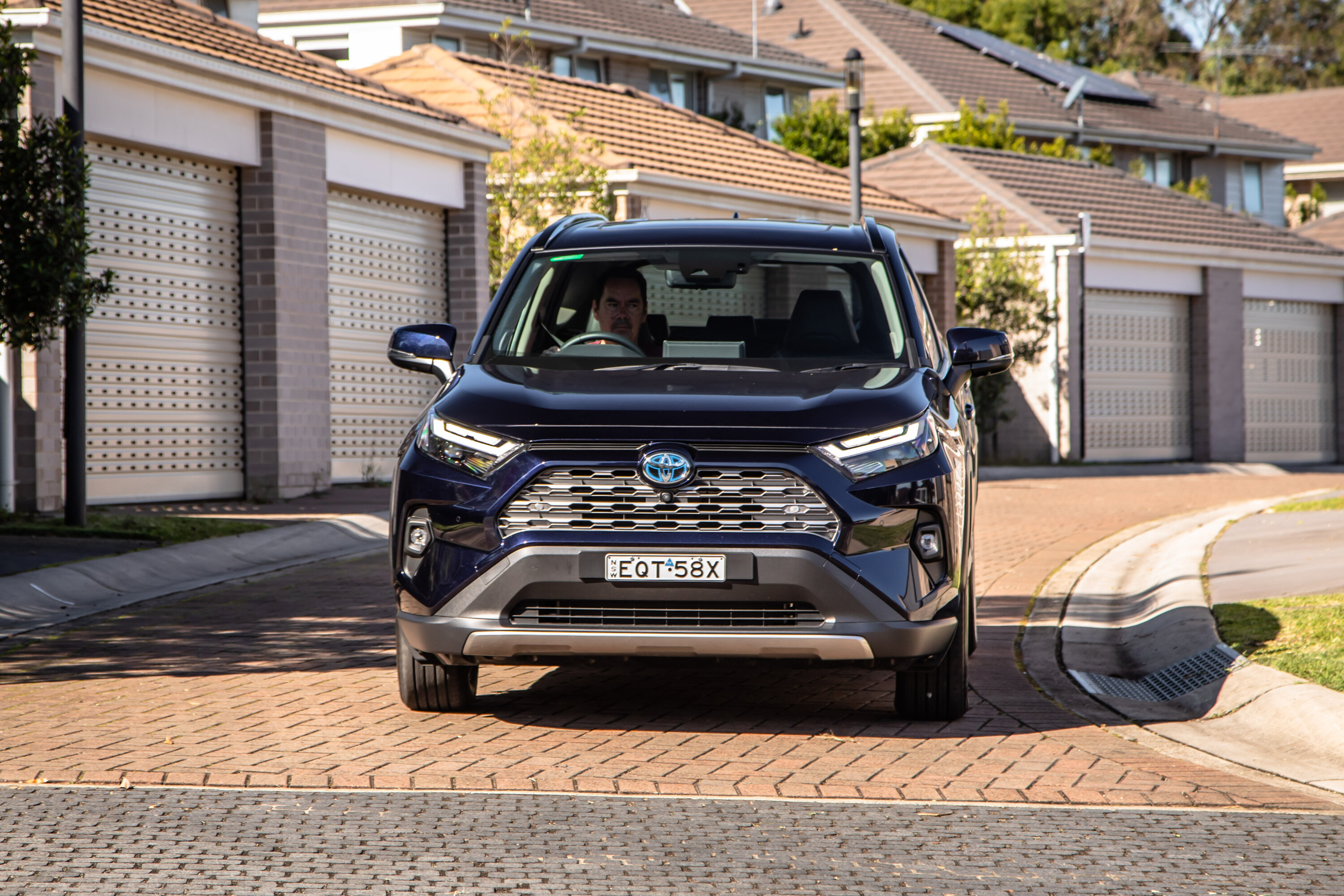
What might I miss that similar cars have?
The Nissan X-Trail and Mitsubishi Outlander offer an extra pair of seats in the third row (trim dependent). While these aren’t big enough for everyday use, it is a reason to consider these rivals over the five-seat-only RAV4.
Also, no turbo-petrol engine is offered and some will prefer more conventional multi-ratio automatic transmissions over the bulk of the RAV4’s continuously variable units. Only the Edge petrol offers an eight-speed torque converter.
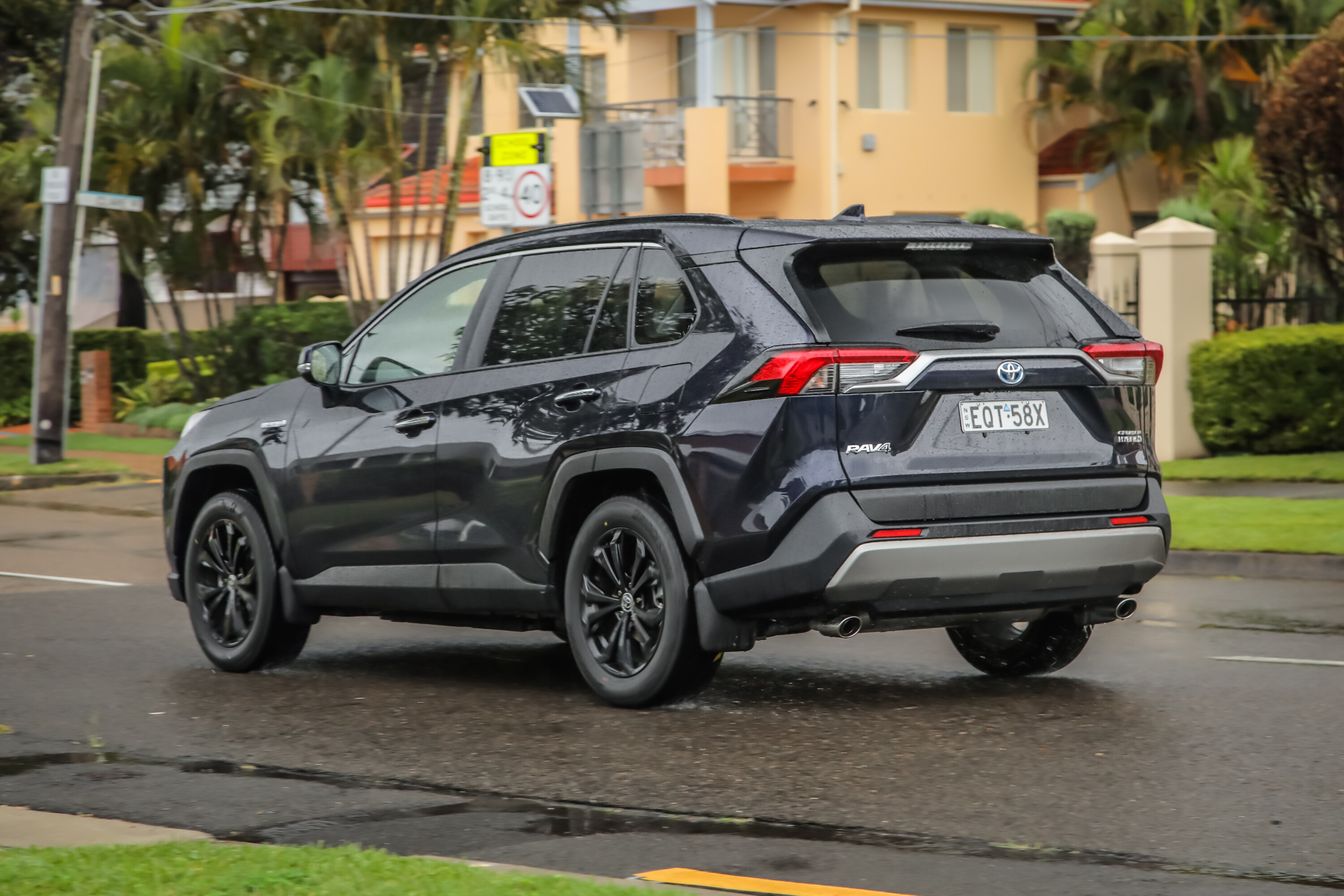
What’s the infotainment system like?
Toyota has recently upgraded the RAV4’s infotainment system.
It now boasts live app updates and connected services, though these are included free for only the first 12 months. After that, it’s an ongoing charge of roughly $23 per month for all features.
Navigation is standard, and the graphics look slick, though it’s not the most responsive system. Wireless Apple CarPlay features on all grades, though Android Auto is wired only.
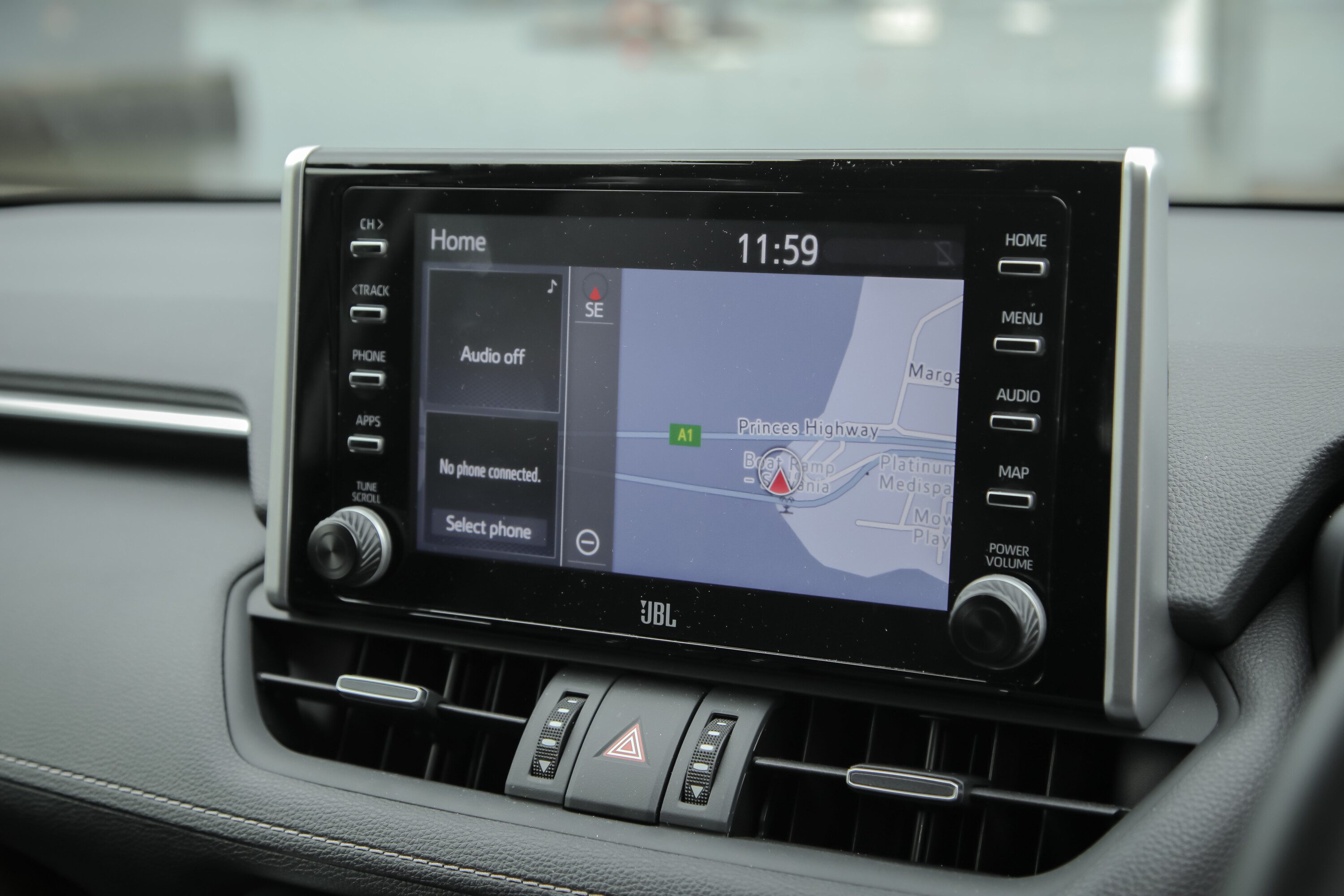
Where does Toyota make the RAV4?
The Toyota RAV4 is built in Japan.
Three separate facilities produce various RAV4 trims, variants and powertrains for Australia.
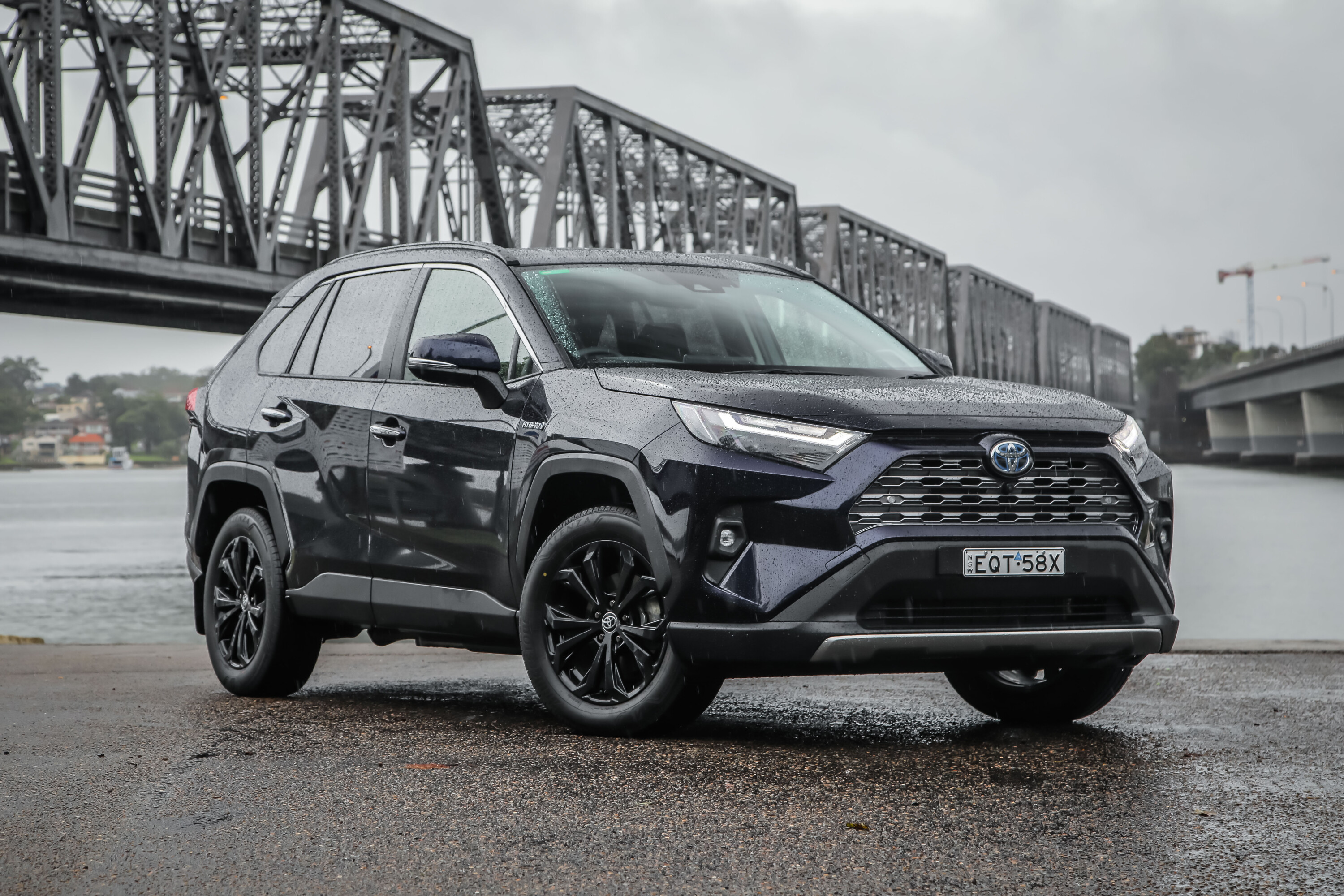
Are there plans to update the RAV4 soon?
The fifth-generation Toyota RAV4 has been around since 2019 and has had several small tweaks since its release – the latest of which was introduced this year.
Although the RAV4 is no longer a spring chicken, it still feels current and up-to-date, with a major refresh not due for at least another two years.
Score breakdown
Things we like
- Efficient hybrid powertrains
- Spacious
- Comfortable ride and fluid handling
- Funky cabin design in Edge
Not so much
- Nobody likes waiting
- Petrol engines are noisy
- Cabin feels a little cheap
- Base model GX best avoided
We recommend
-
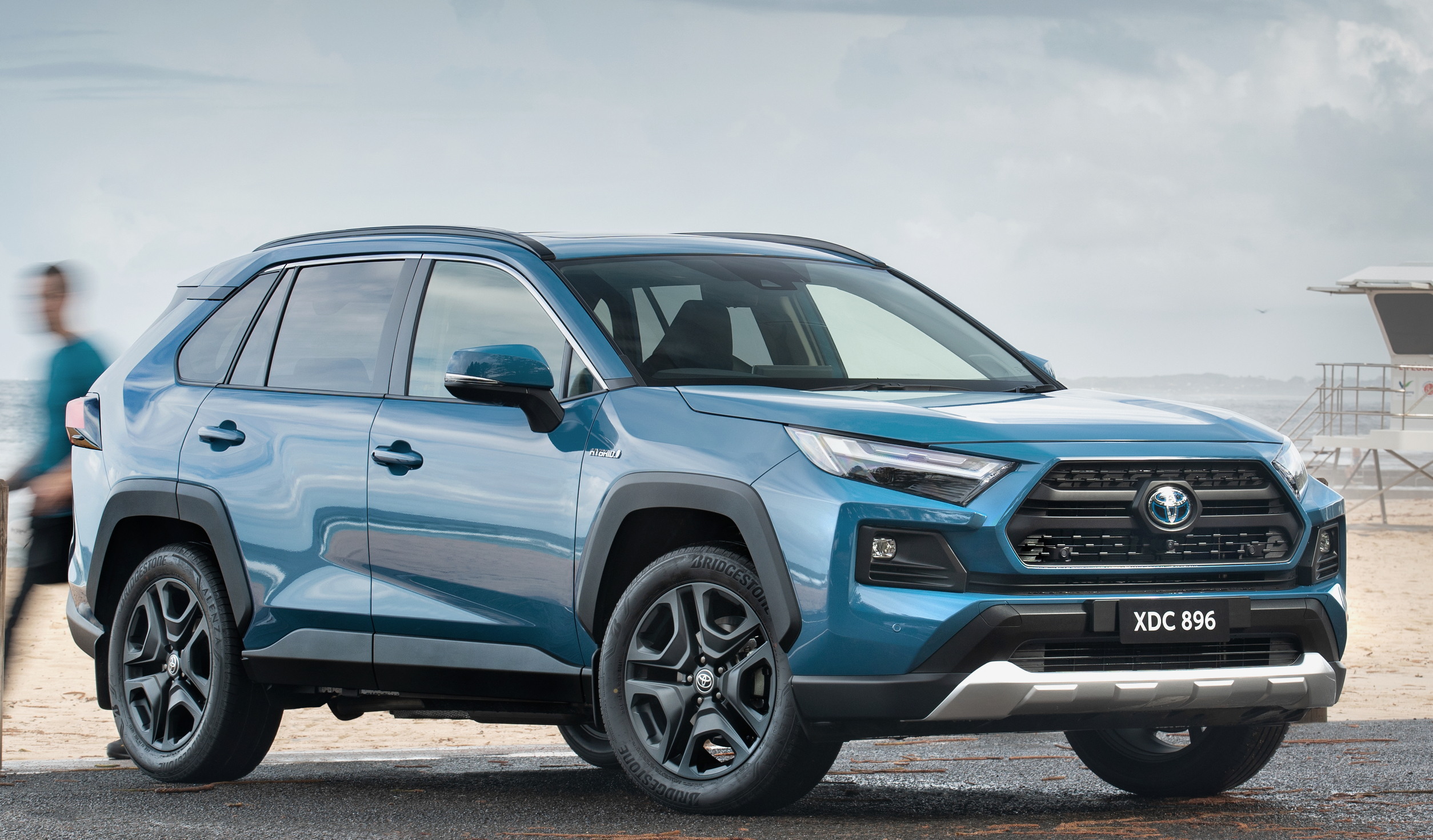 News
News2023 Toyota RAV4 pricing and features
The updated Toyota RAV4 medium SUV has arrived in Australia with new technology and improved specification – but with price rises of up to $2820
-
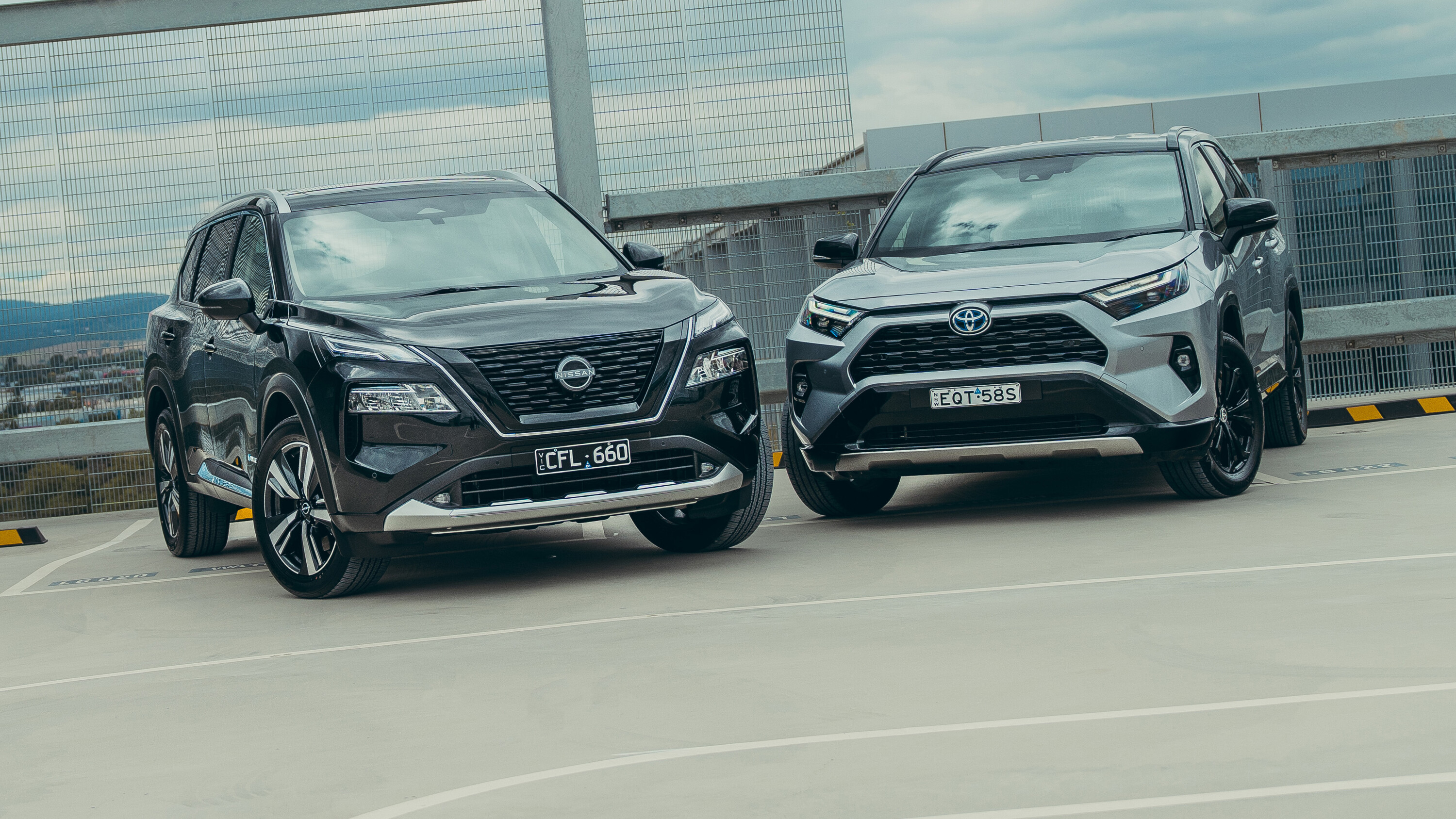 Comparisons
ComparisonsHybrid SUVs compared: 2023 Nissan X-Trail E-Power vs Toyota RAV4 hybrid
Toyota’s dominant RAV4 is comprehensively pipped by Nissan’s clever new hybrid X-Trail E-Power – and not just because you can get one sooner
-
 News
News2025 New Car Calendar: All the new cars coming to Australia
Take a look at our list of what is expected to launch in Australia in 2025 – plus those we might not see locally just yet


